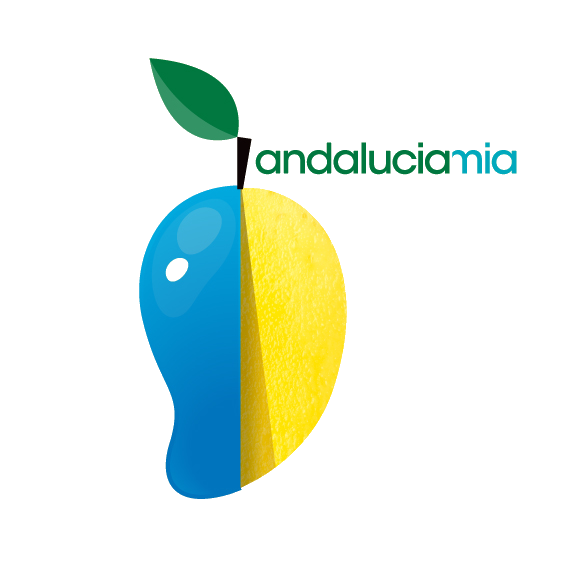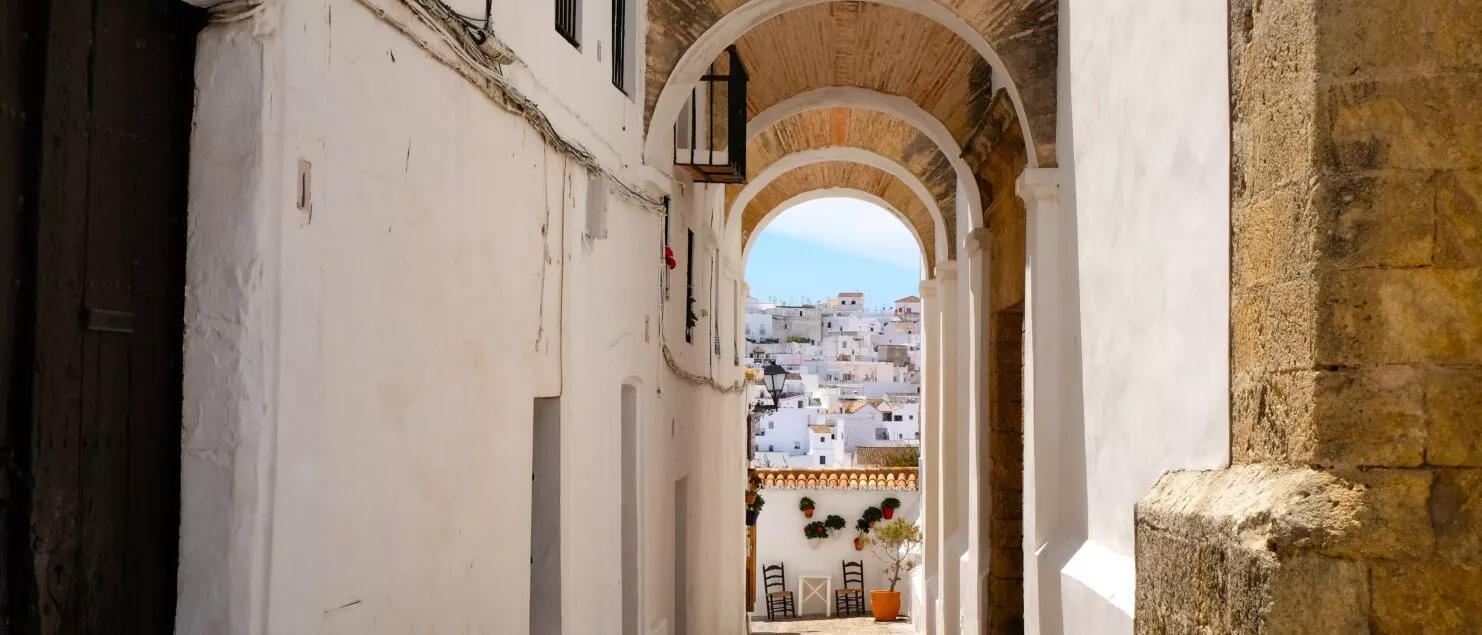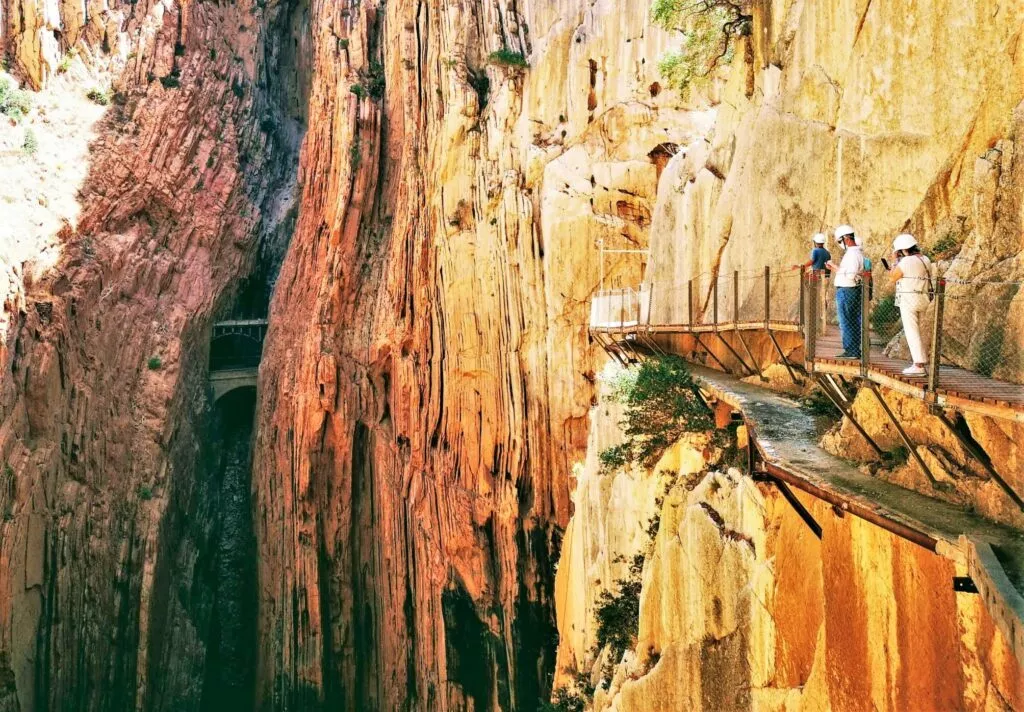What to see in Vejer de la Frontera – these are the 19 must-sees
The must-sees in Vejer de la Frontera
In this article you’ll find the essential information on what to see and do in Vejer de la Frontera:
- A few words about Vejer de la Frontera
- Where is Vejer on the map?
- What to see in Vejer de la Frontera?
- What to do in Vejer
- Booking accommodation
- Dates of the Village Fair
- Useful links (bookings and visits in Andalucia)
- What to see near Vejer
- Continuing your trip to Andalucia
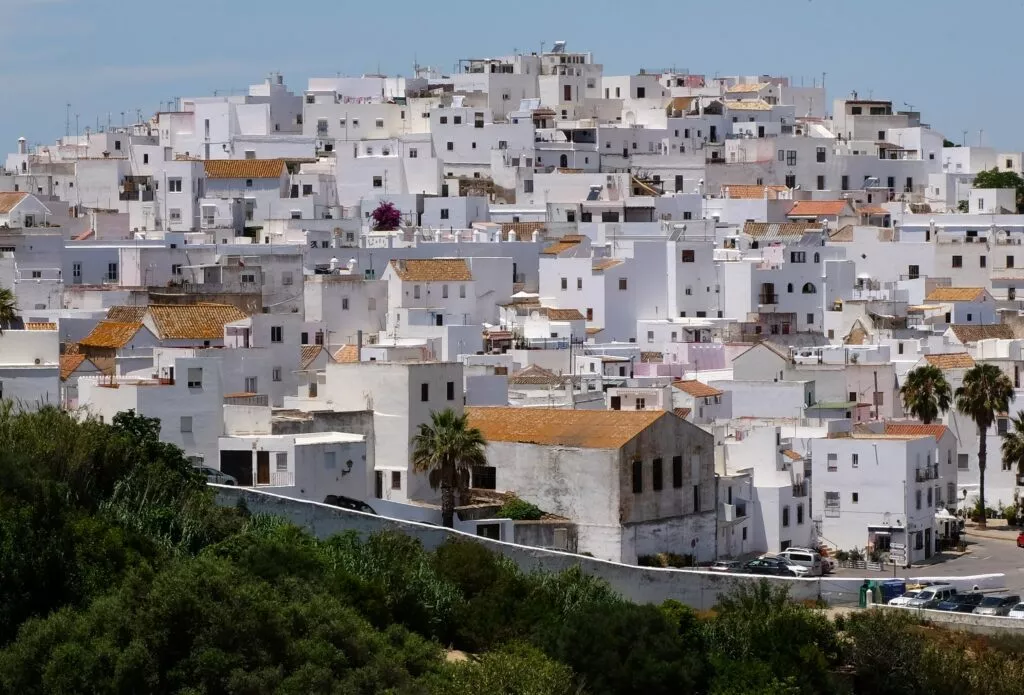
A few words about Vejer de la Frontera
Vejer de la Frontera is a beautiful white village in the province of Cadiz, in Andalucia. It has a very long history, having been occupied by Phoenicians, Carthaginians, Romans, Visigoths and Moors.
The village is located on a hilltop on the right bank of the River Barbate. The village occupies a hill overlooking the Straits of Gibraltar and is surrounded by orchards, orange groves and marshes.
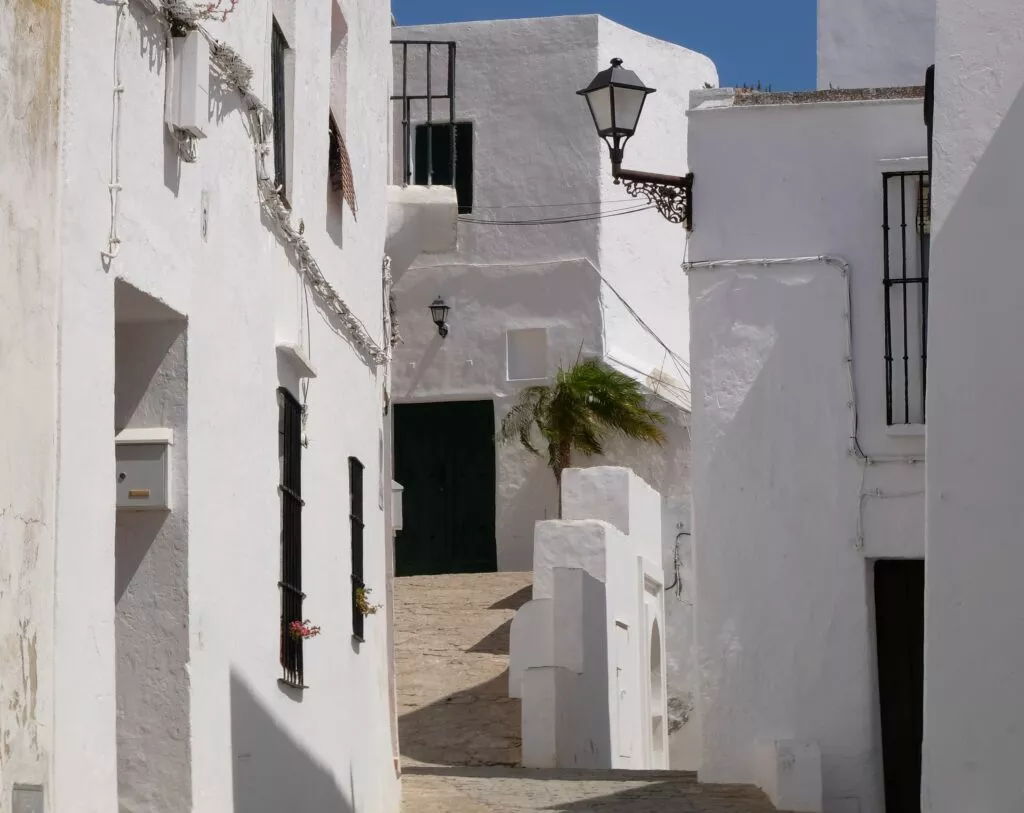
Vejer is a not-to-be-missed village on the Route of the White Villages. It has retained its authenticity and boasts some incredible aesthetics. In fact, it features on the list of the “Pueblos más bonitos de España”, just like the incredible Setenil de las Bodegas, or the superb white village of Frigiliana in the province of Málaga.
Vejer is home to several monuments worthy of interest. In addition, its architecture, including that of the houses, recalls the period of Moorish domination, which lasted from 711 until the capture of the city by Saint Ferdinand of Castile in 1248.
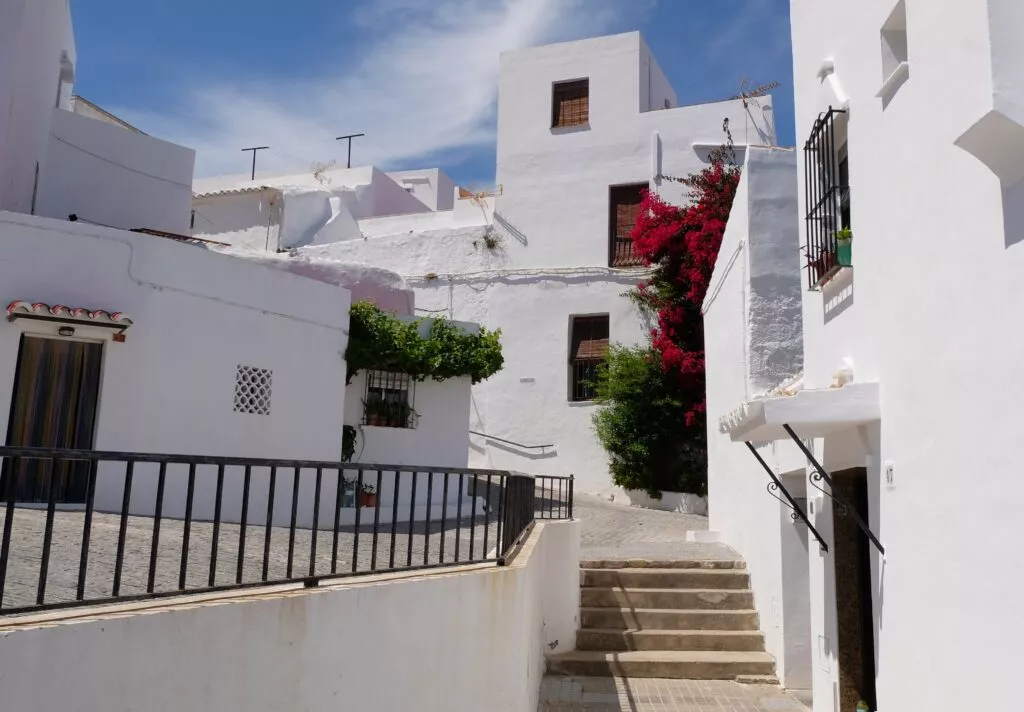
The Moors left a lasting influence on the city’s gastronomy, architecture and culture. In 1248, Saint Ferdinand of Castile captured the city during the Reconquista. From this date until the 19th century, Vejer was an important observation point for the defense of the coast against Barbary pirates from North Africa.
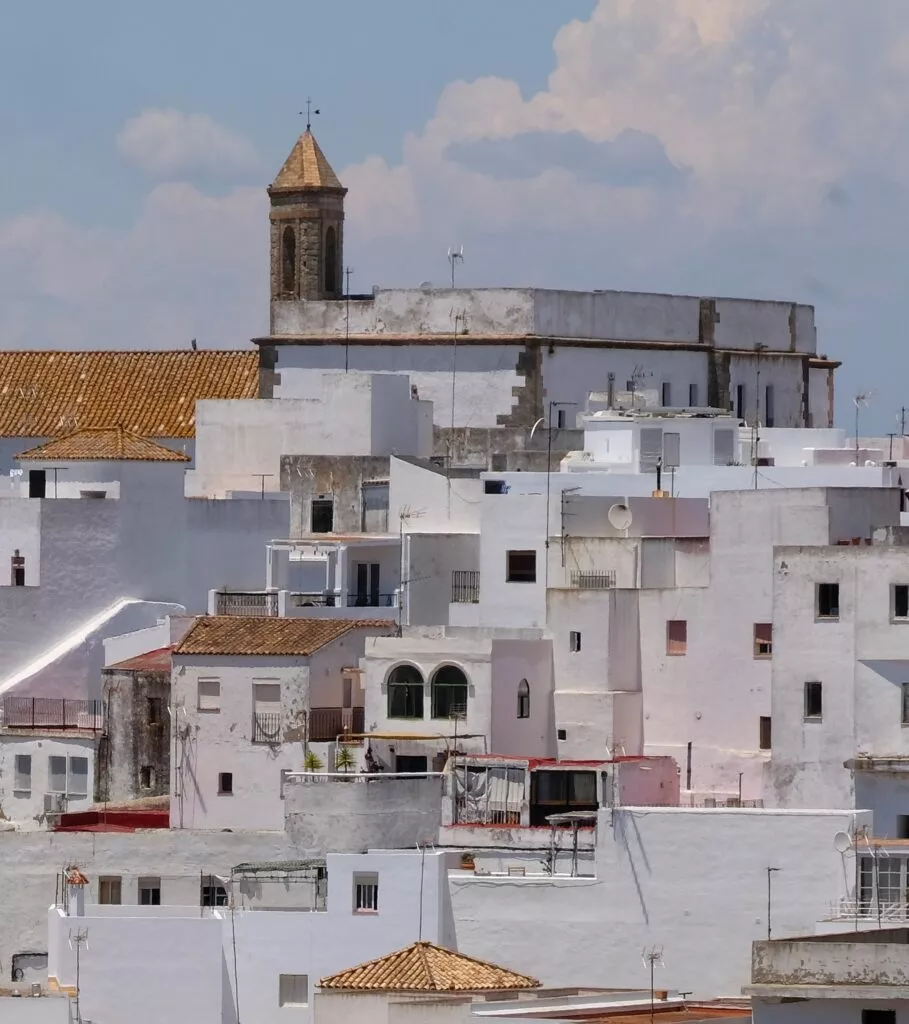
The term: de la Frontera
The name “Vejer de la Frontera”: The term “Frontera” means border, reflecting the city’s position near the border between Christian and Muslim territories during the Reconquista period. This border has been modified over time, as territories have been conquered.
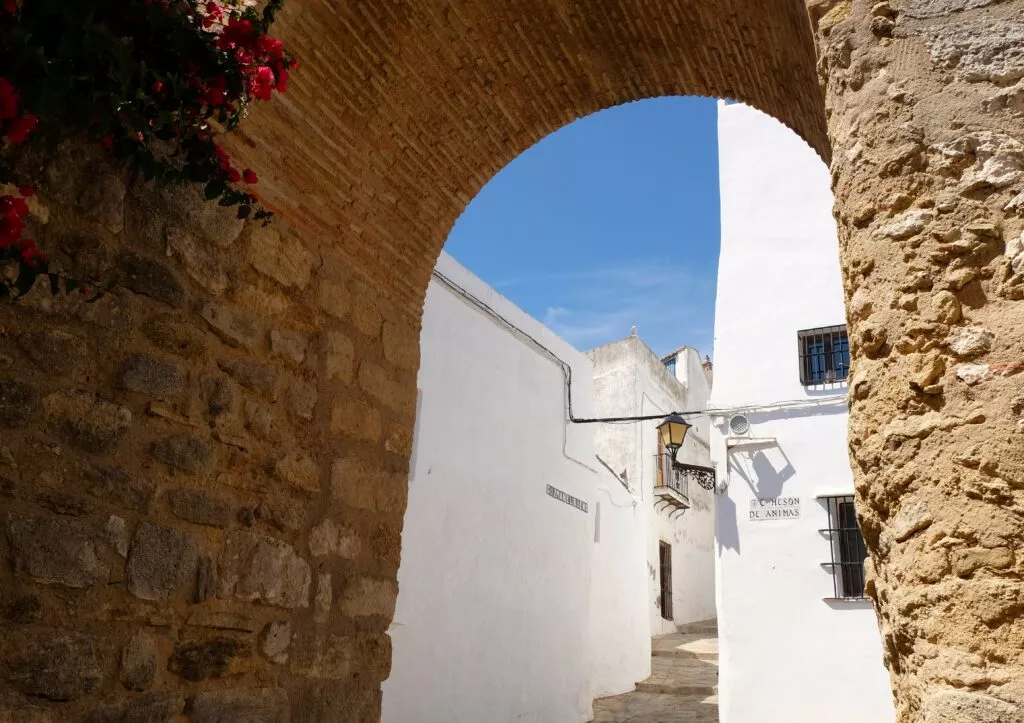
We can see this when we look on a map at the geographical position of the villages with “de la frontera” which chronologically get closer and closer to Granada:
- Castellar de la Frontera
- Chiclana de la Frontera
- Jerez de la Frontera
- Conil de la Frontera
- Arcos de la Frontera
- Jimena de la Frontera
- Morón de la Frontera
- Aguilar de la Frontera
- Cortes de la Frontera
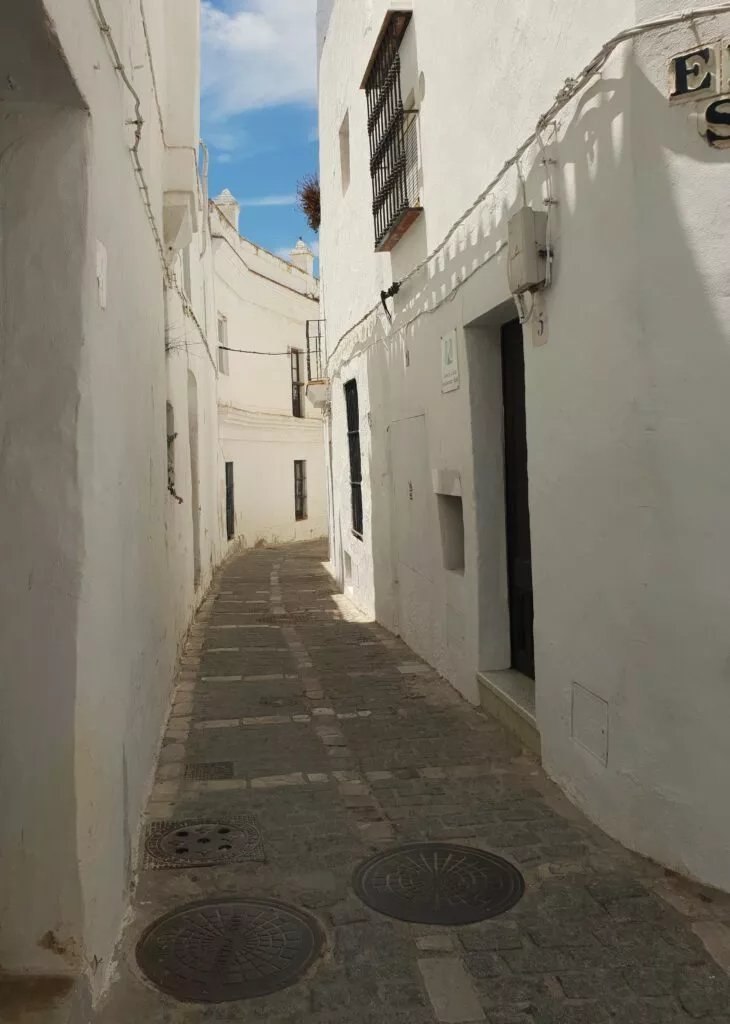
Where is Vejer de la Frontera on the map
What to see in Vejer de la Frontera ?
- Its quiet, narrow cobbled streets
- Los arcos de las Monjas
- Calle Judería
- The old Jewish quarter of Vejer de la Frontera
- The walls of Vejer de la Frontera
- Arch of the Closed Gate
- The Museum of Vejer
- The windmills
- Puerta de sancho IV
- Church of the Divine Saviour
- Plaza de España
- Medieval castle
- Besamé en este Rincón
- Puerta de la Segur
- Torre del Mayorazgo
- The viewpoints of Vejer de la Frontera
- Viewpoint of Aves Ibis Eremita
- La Cobijada
- The beaches of Vejer
Vejer de la Frontera is known for its quiet cobblestone streets and many secret corners and hidden courtyards. The city has two distinct zones: the coast and the interior.
It was declared a historic and artistic site in 1976.
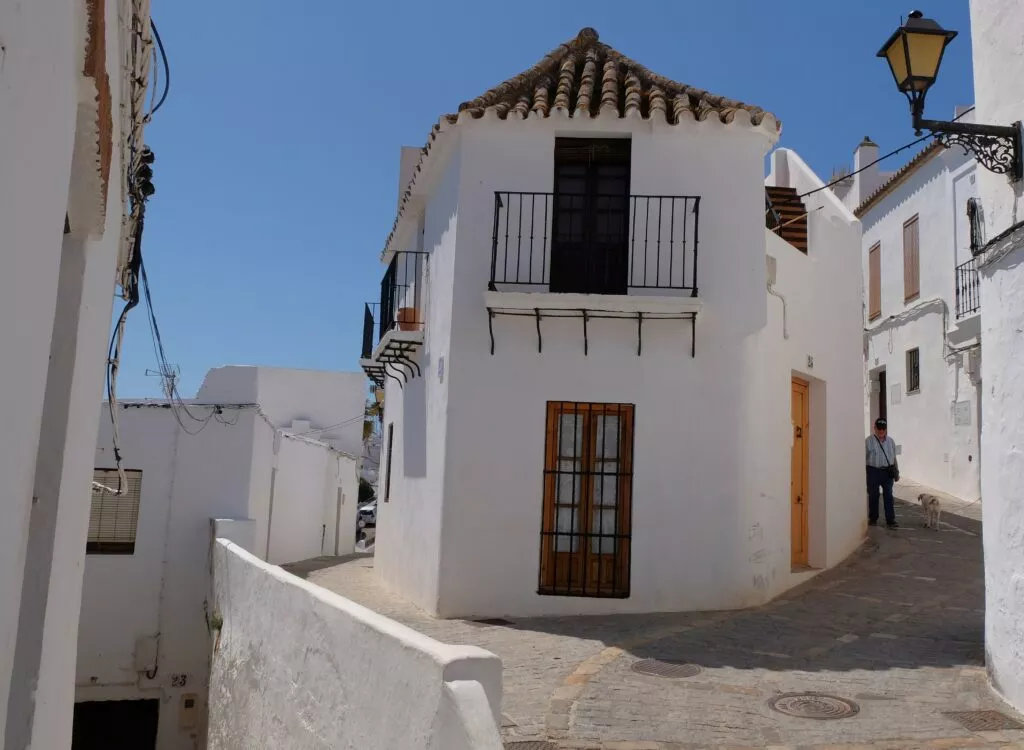
Vejer is also known for its picturesque architecture, with white buildings and narrow, one-way streets. The ideal will be to park at the entrance to the village, and avoid driving by car.
The historic center is filled with the charm of Andalusian white villages.
Los arcos de las Monjas a must-see in Vejer de la Frontera
Let’s start the visit to Vejer through the most iconic place in the village. These are the arcos de las monjas – nuns’ arches. You arrive at Callejón de las Monjas via Calle Judería.
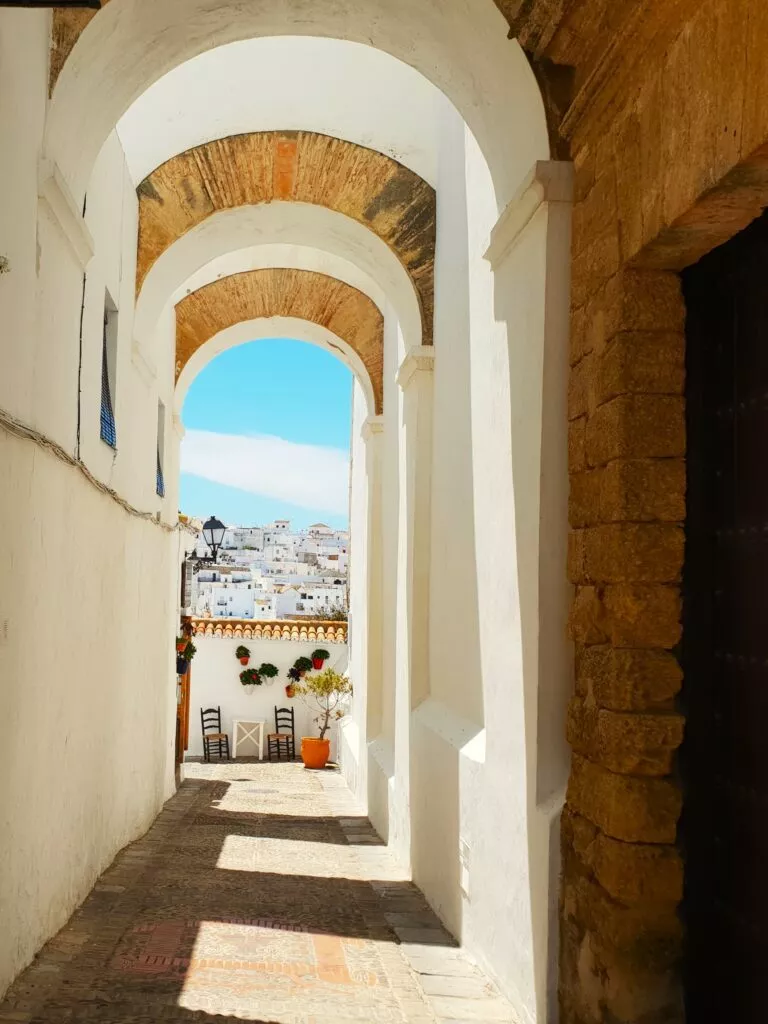
As the name of the street indicates, we are in the old Jewish quarter of Vejer de la Frontera. This is Judería (13th-15th century).
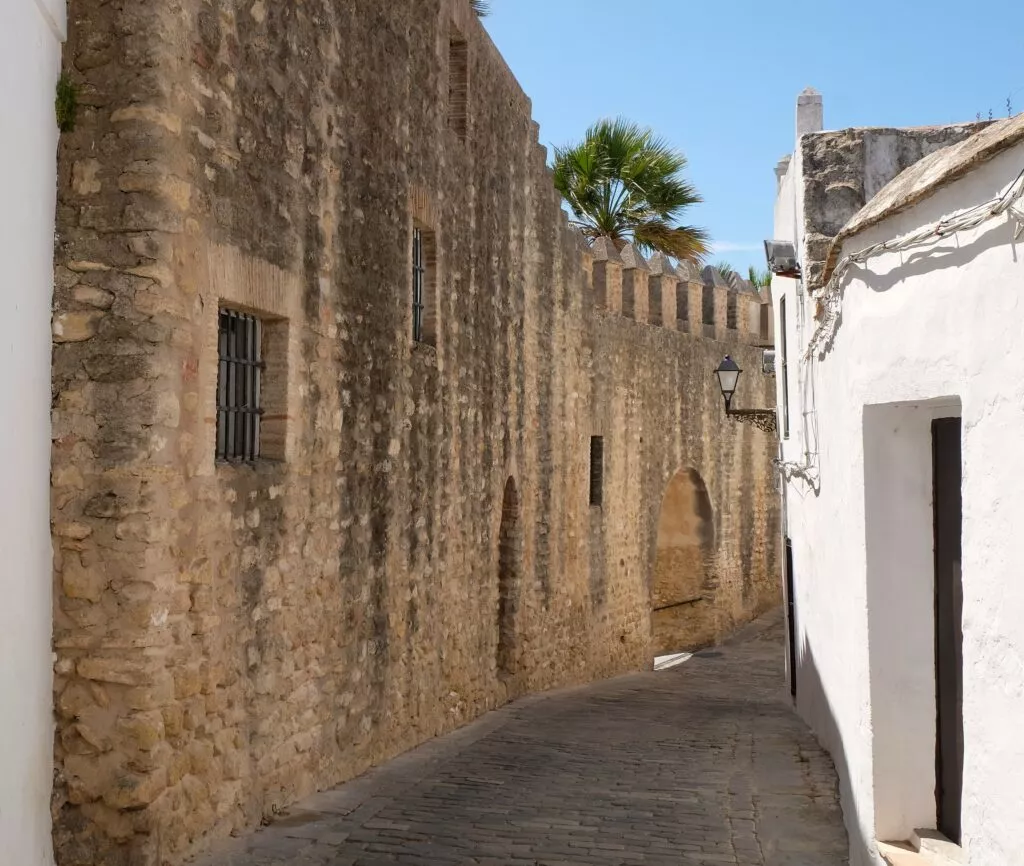
The wall a historical treasure to see in Vejer de la Frontera
This wall dates from the Nasrid era.
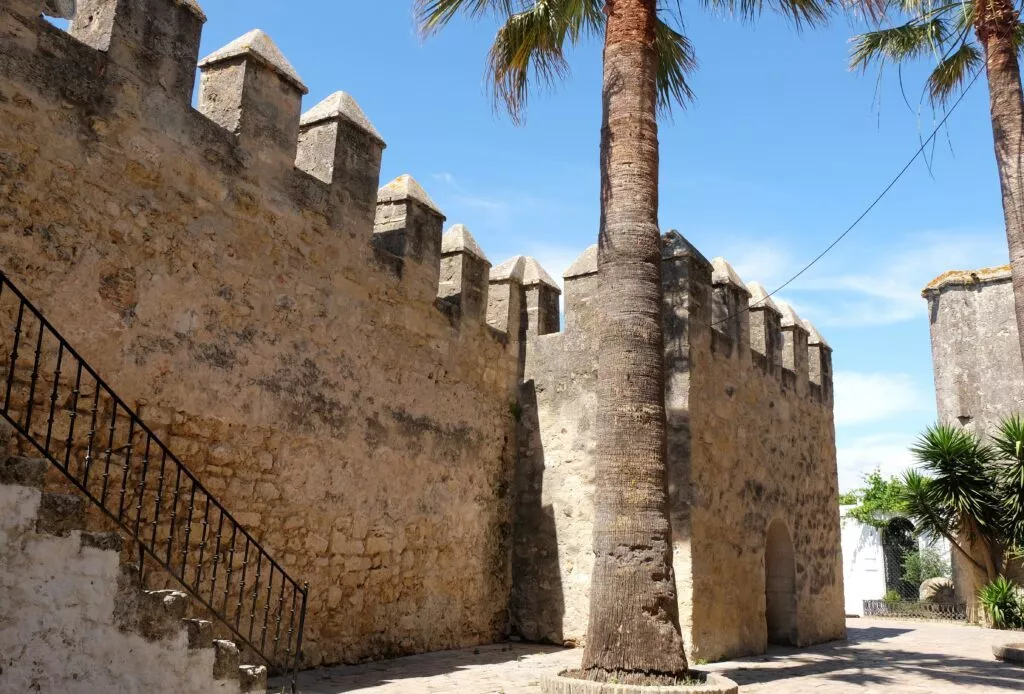
The ancient walls of Vejer de la Frontera are well preserved and offer a pleasant walk along their ramparts.
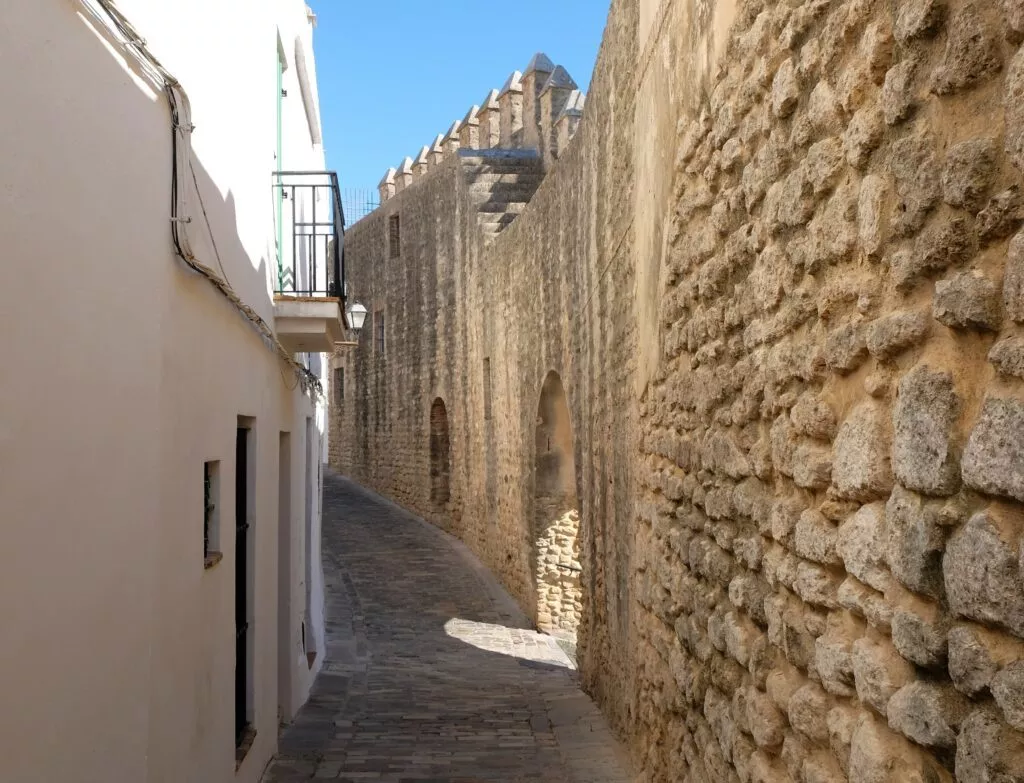
Many elements of the wall can be found when visiting the city, particularly in the ancient juderia.
Arco de la Puerta Cerrada – Arch of the Closed Door –
The Puerta cerrada is one of the four gates that remain in the wall today.
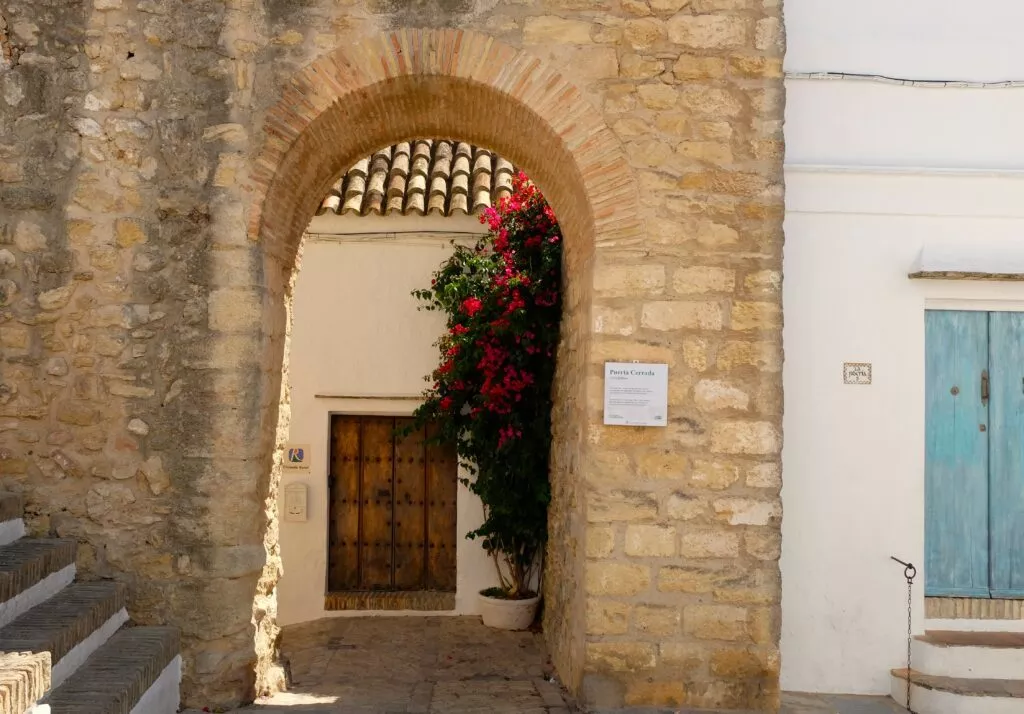
It owes its name to the history of the village: Vejer suffered attacks from pirates from North Africa for a long time. This door, located in the old Jewish quarter, was particularly exposed. It ended up being walled up and therefore closed! It has since been reopened.
Finally, this gate has two other names: Puerta del Sur and Puerta de Berbería.
The Vejer de la Frontera Museum
Located in the former Casa Palacio Marqués de Tamarón, built in the 18th century, this museum has 13 rooms. Within the museum, archaeological collections are exhibited, providing insight into the historical development of the town from the Paleolithic to the present day.
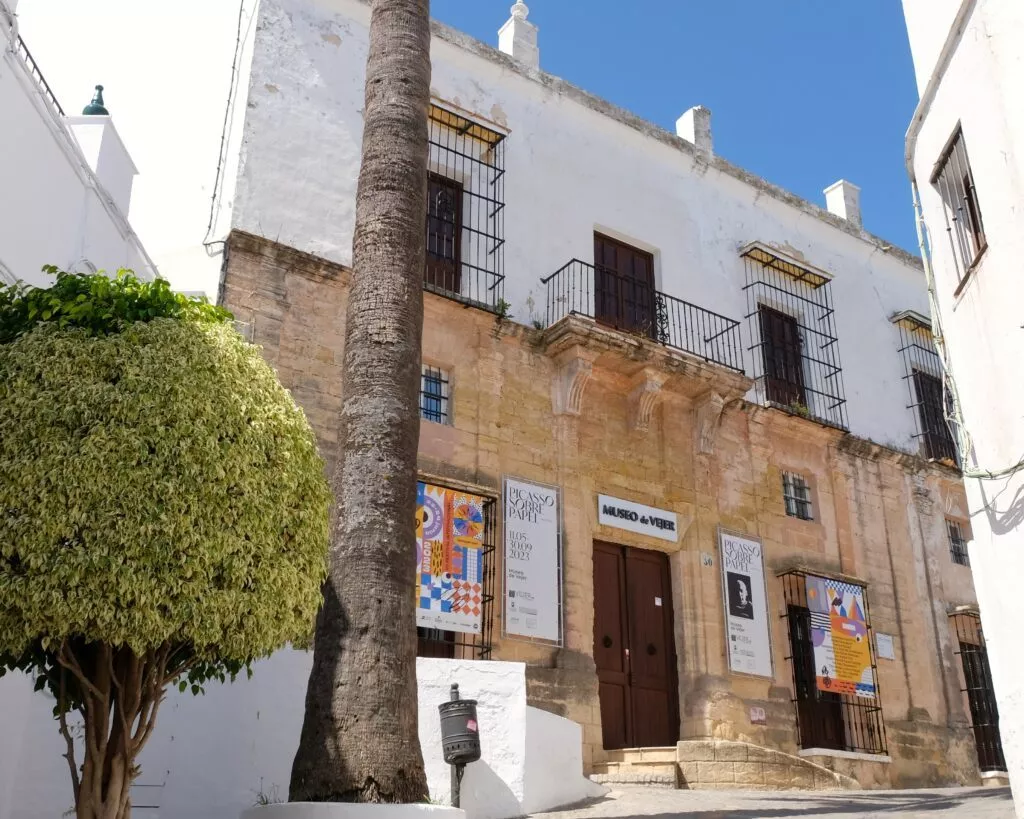
The Vejer Museum also includes fine arts rooms, where the Julia Relinque collection stands out, and temporary exhibitions.
Windmills an emblematic place to see in Vejer de la Frontera
Here is the second iconic element of Vejer de la Frontera: the windmills.
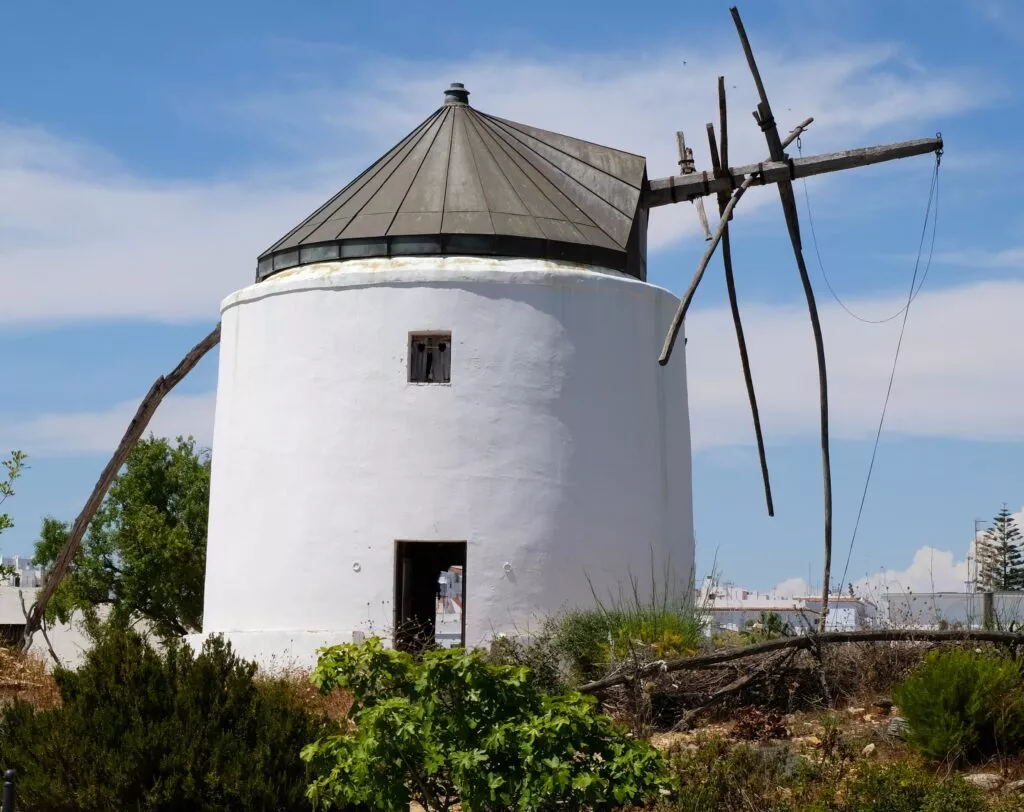
These were built in the 1960s to replace water mills. They were used to grind wheat to produce flour.
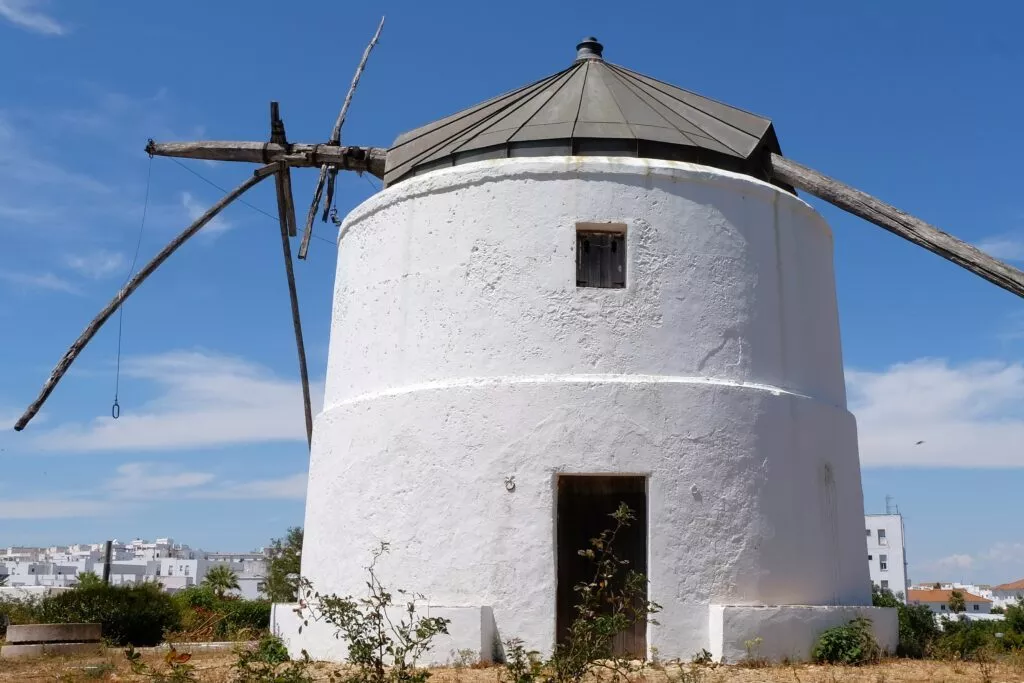
Some of them have been restored and can be visited to learn more about how they work.
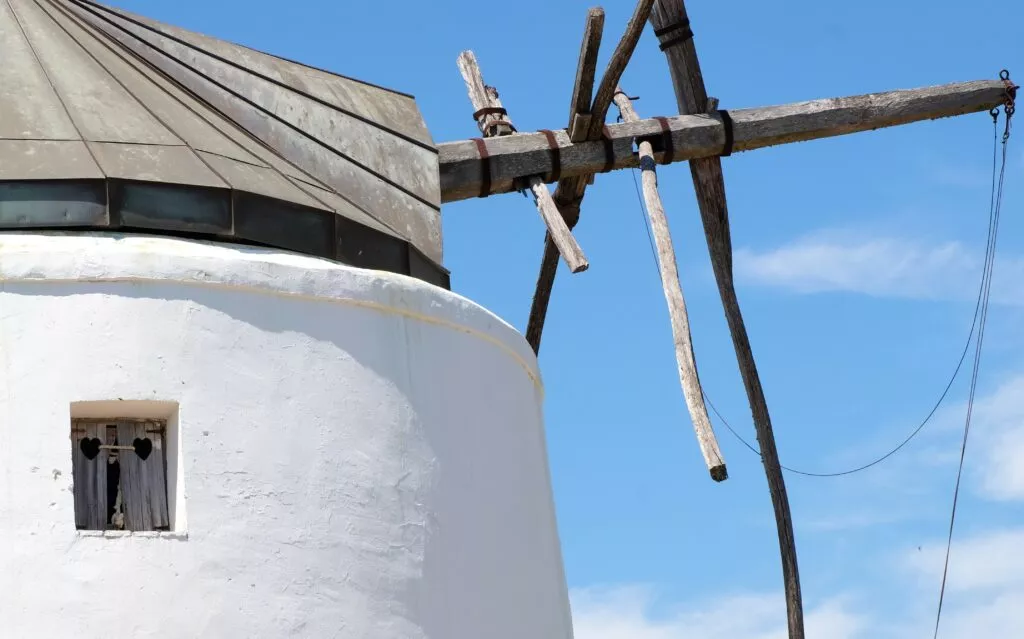
Puerta de sancho IV
The Puerta de Sancho IV is also one of the very beautiful gates to enter the ancient Medina.
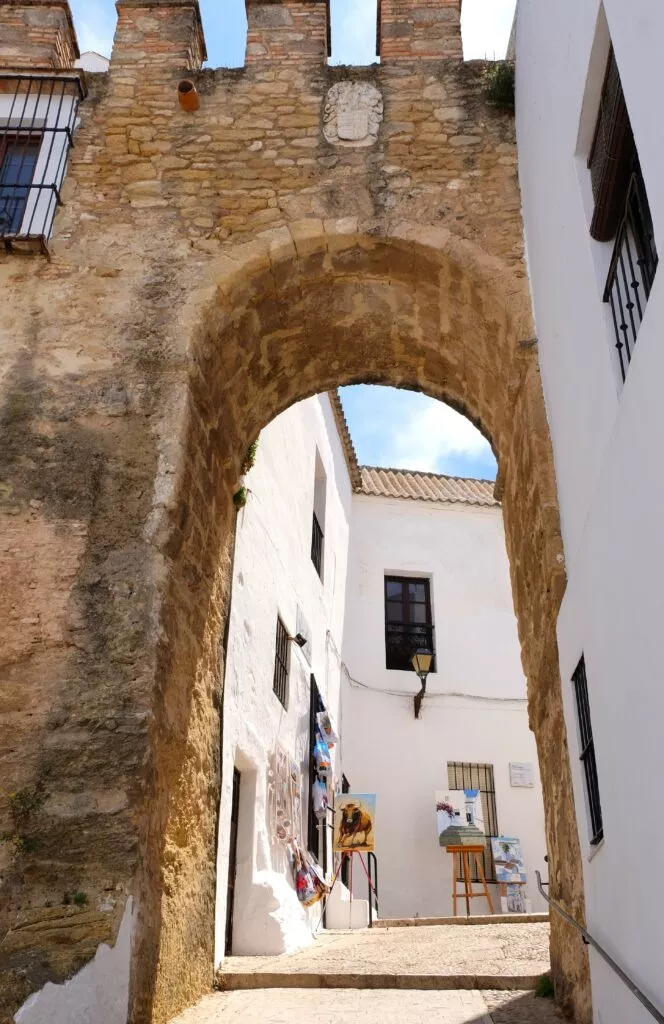
Church of the Divine Savior
This is a remarkable church.

This Church of the Divine Savior dates from the 17th century (the base dates from the 14th century) and is a magnificent example of Andalusian baroque architecture.
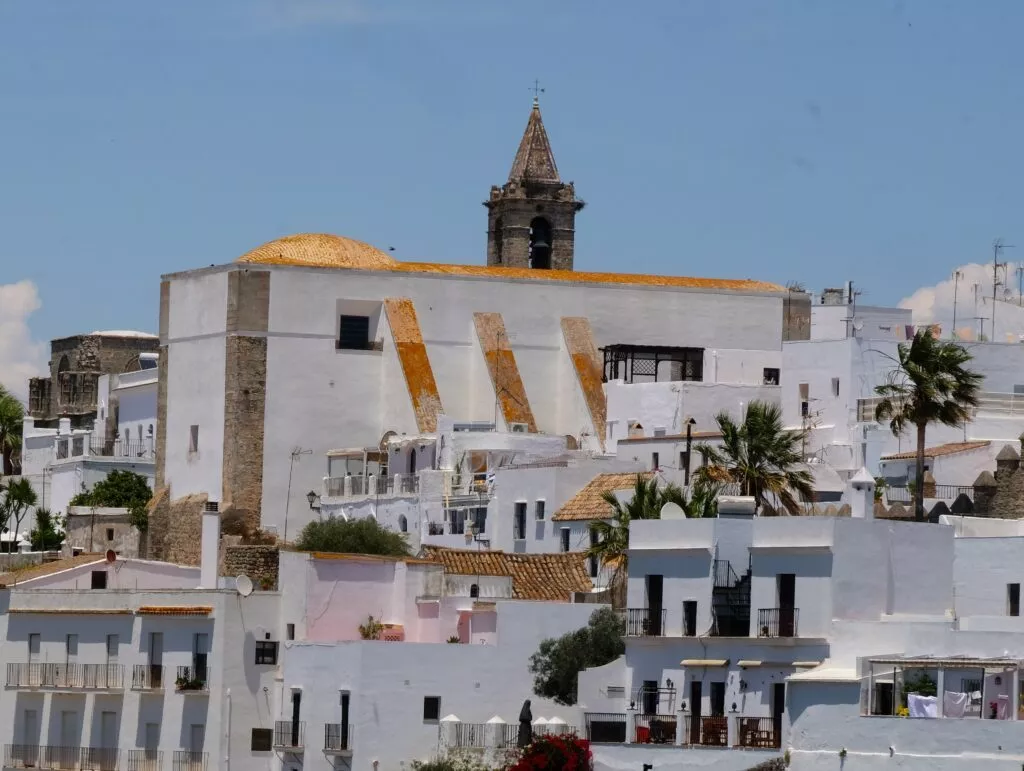
The Plaza de España
The Spain Square is the central square. It has a large fountain decorated with ceramics, lined with palm trees, shops and restaurants.
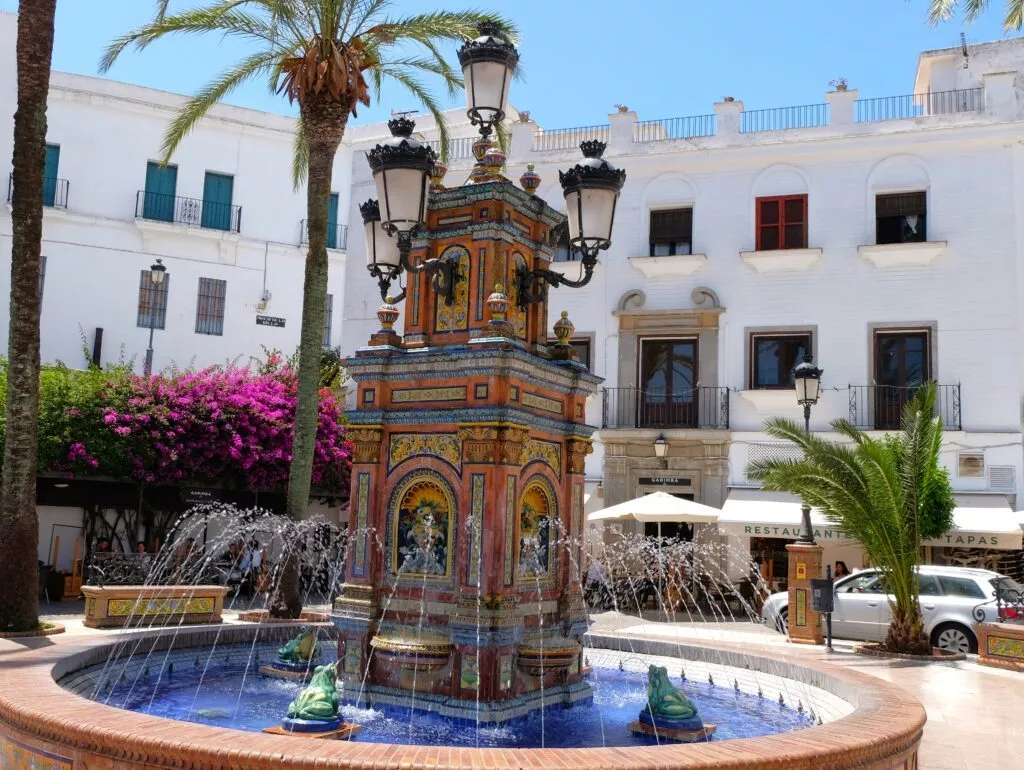
This central square is a great place to relax and enjoy the ambiance of Vejer de la Frontera.
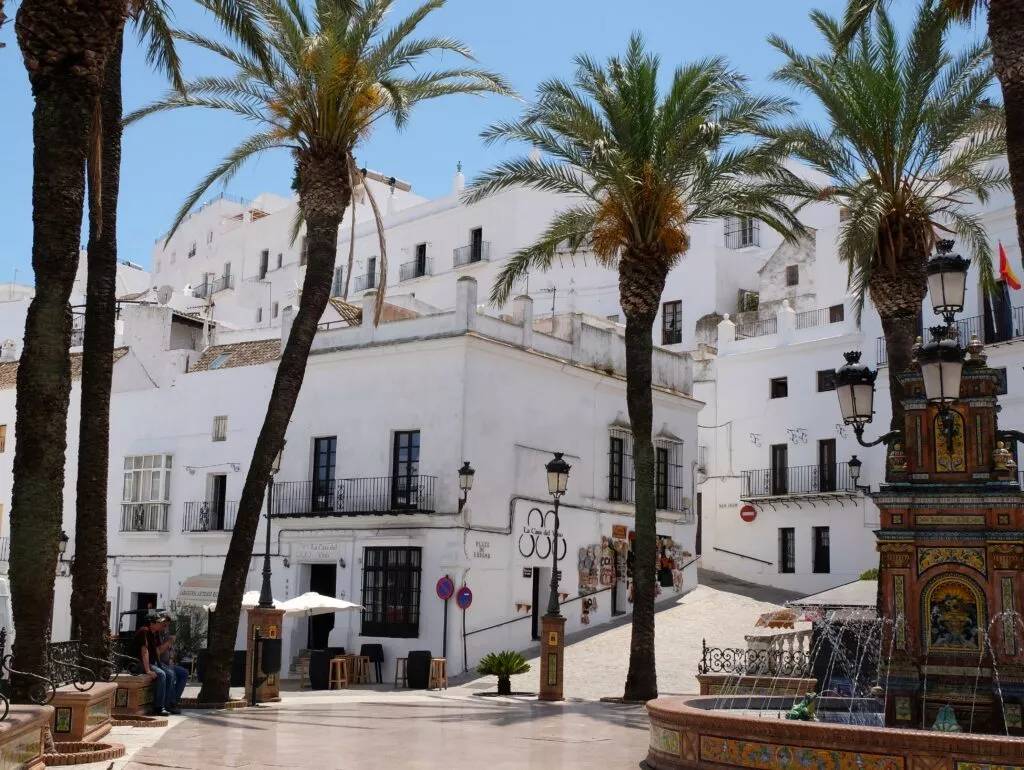
Surrounded by historic buildings, it is often bustling with local events and festivals.
Medieval Castle of Vejer de la Frontera
It dominates the village at the top of the hill on which the village is built.
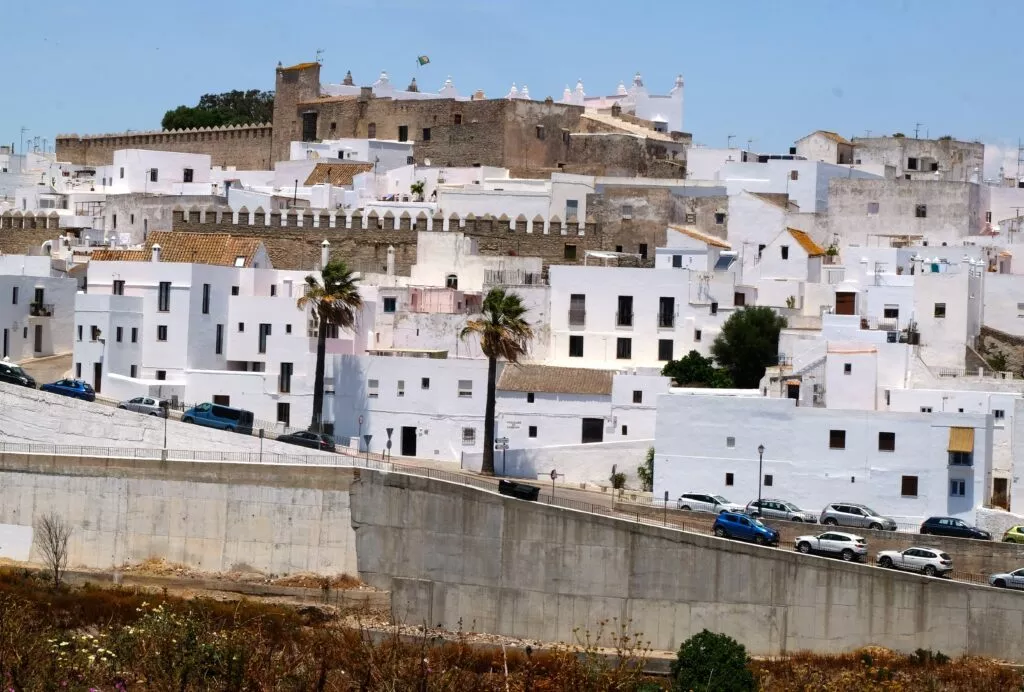
The village was built around it during the Nasrid period (last period of the kingdom of Granada). It is possible to visit certain ruins and parts of the castle.
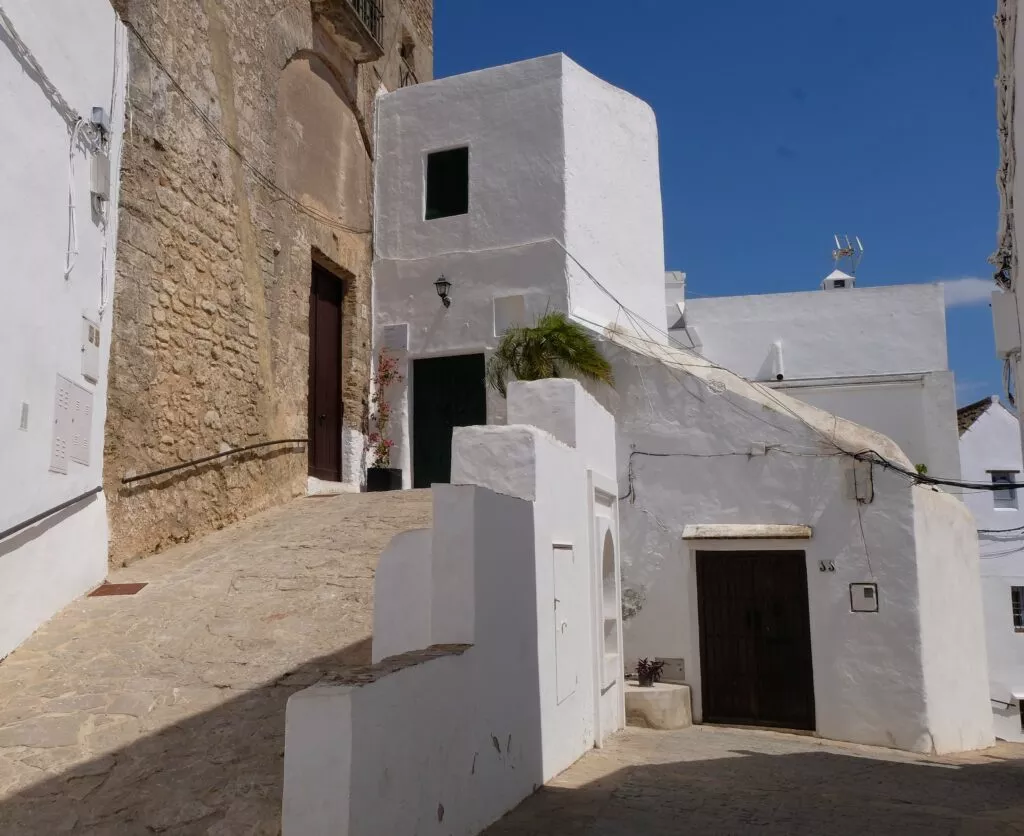
Besamé en este Rincón – Kiss me in this place –
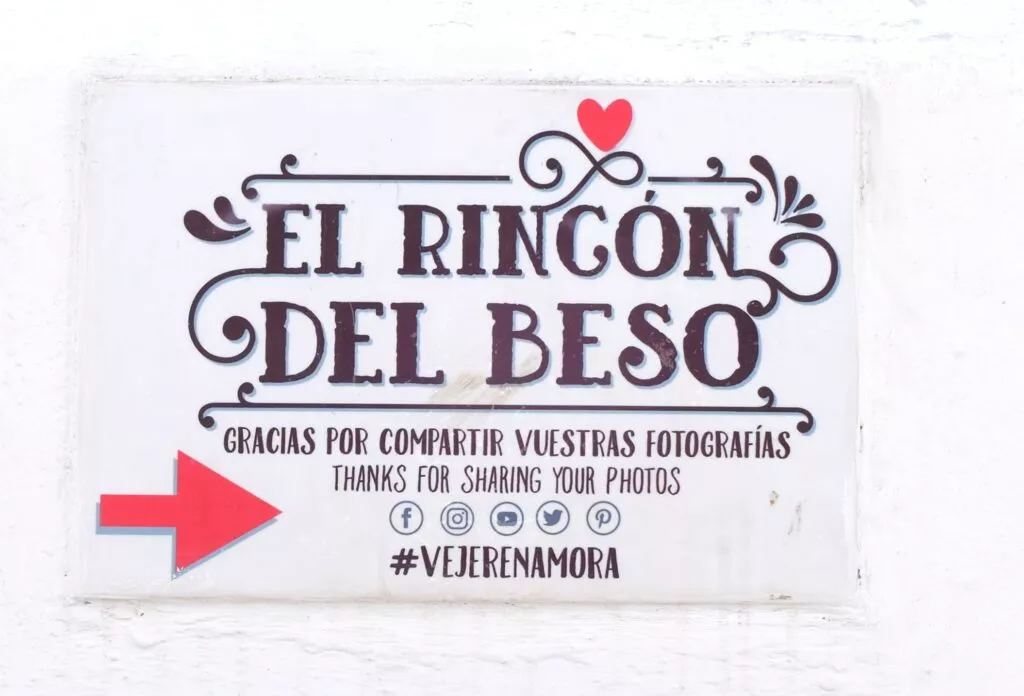
In many villages today we find this inscription on a wall. It is always a beautiful, photogenic place to take a souvenir photo between lovers. See below :
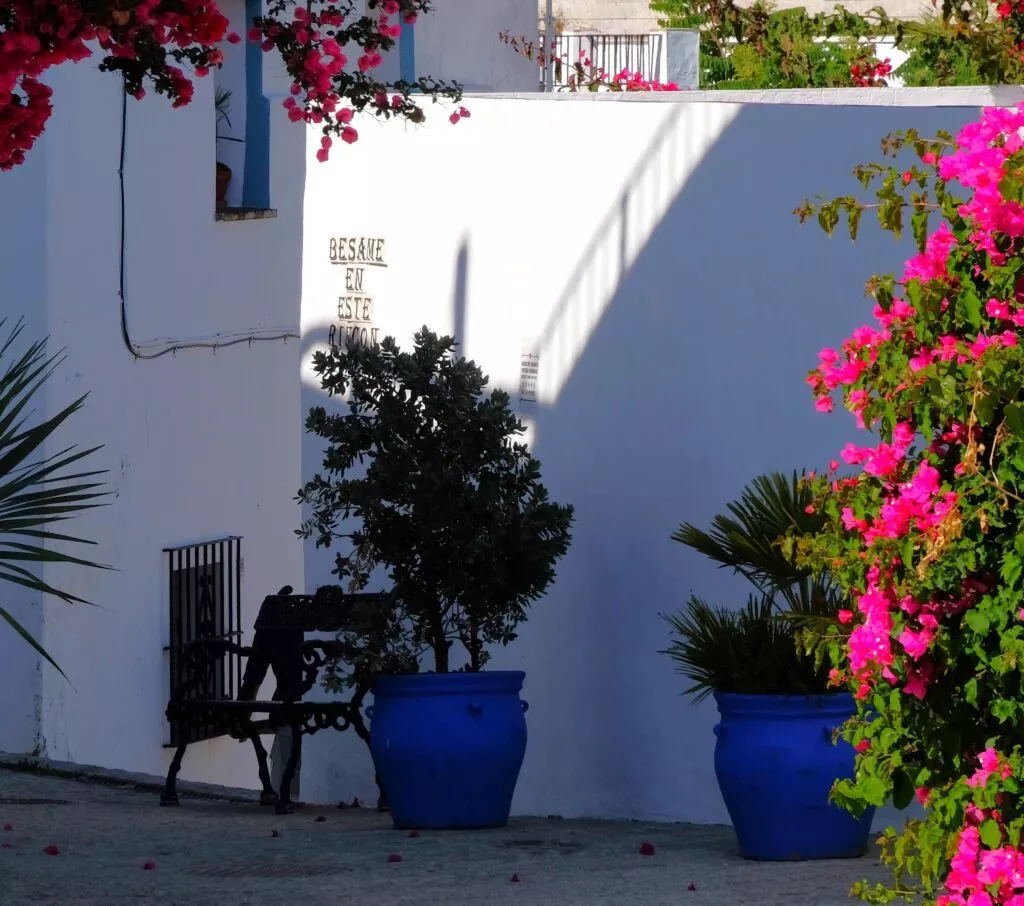
Here is its exact location.
Puerta de la Segur
The Segur Gate – Puerta de la Segur – is one of my favorite places in Vejer de la Frontera.
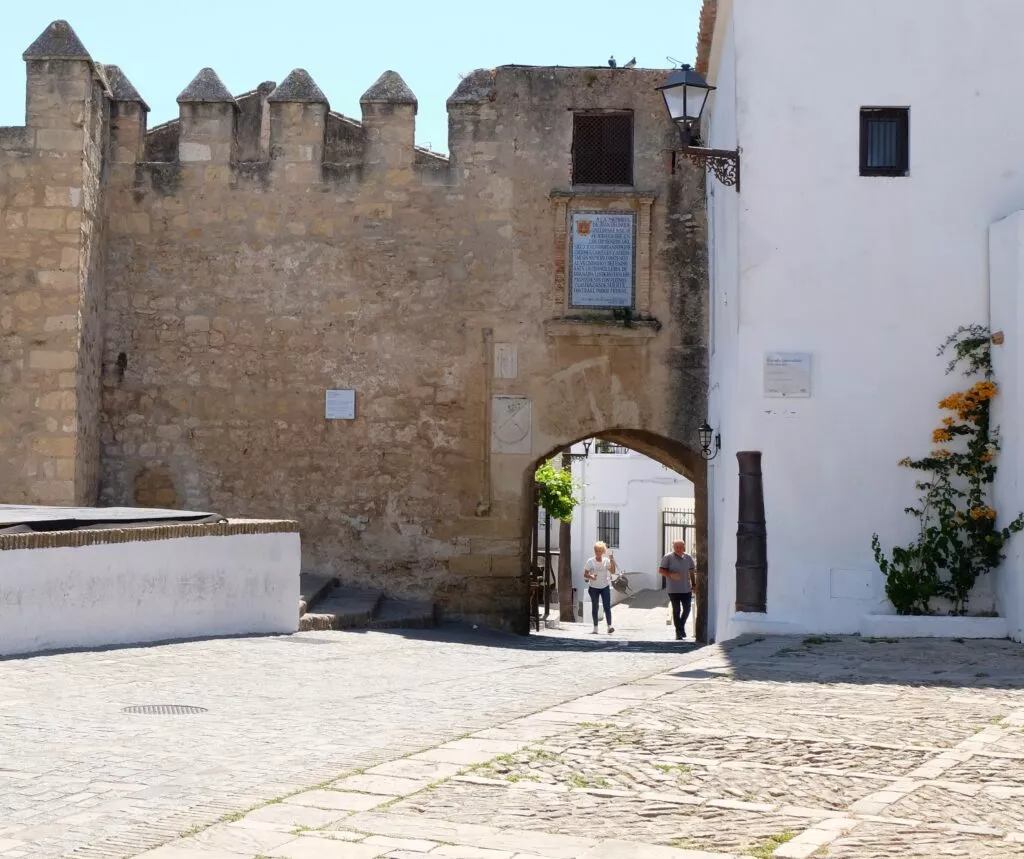
There is also a bar ideally located, on the other side of the wall, to have a drink, accompanied by some tapas.
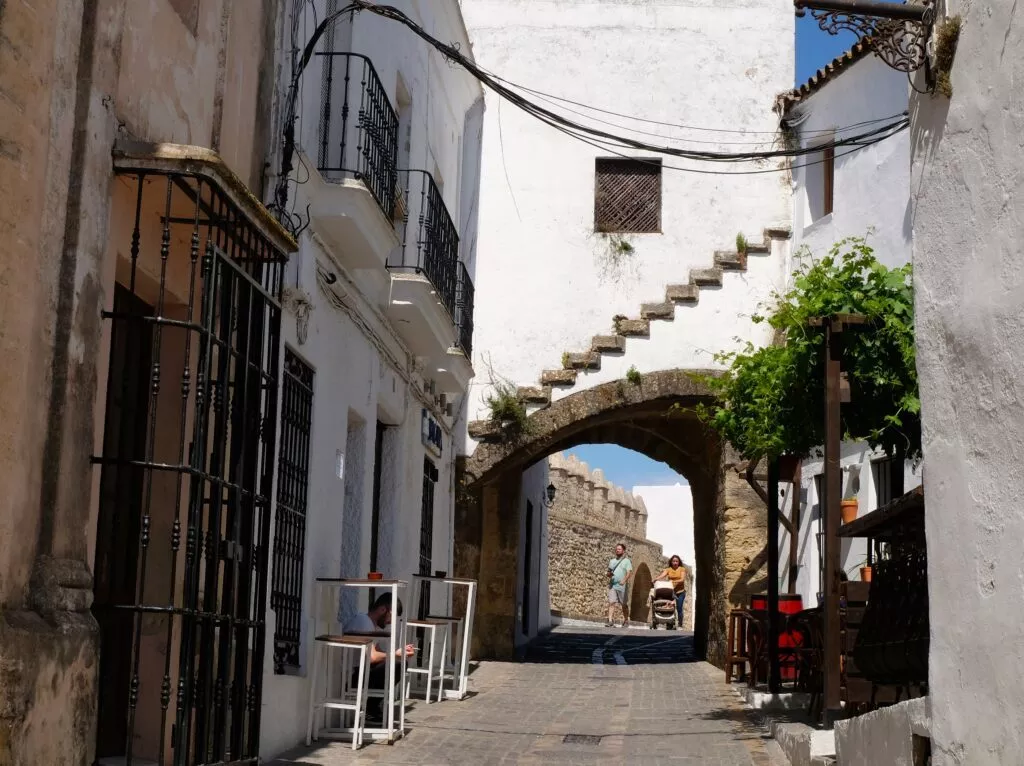
The Mayorazgo Tower
This tower can be visited as long as you don’t make too much noise because families live in what is now a manor!
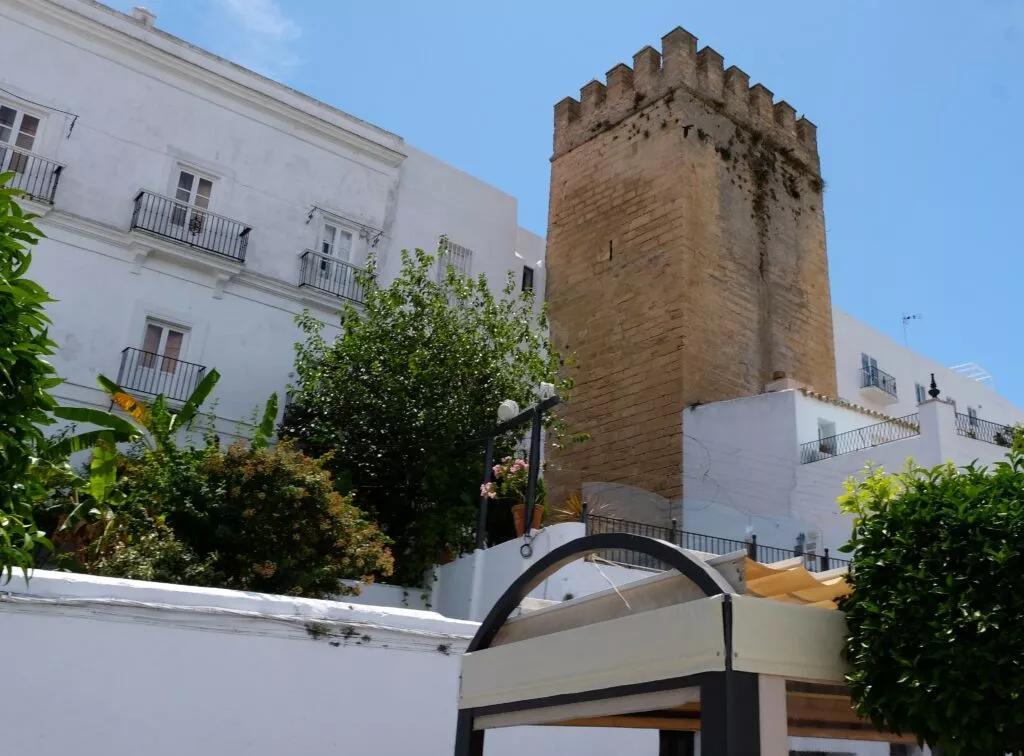
If you visit on a clear day then you will see the African coasts from the top of the tower!
The viewpoints of Vejer de la Frontera
The village, located at the top of a hill and which was previously subject to frequent attacks, retains numerous viewpoint.
It is interesting to go see these viewpoints to benefit from magnificent views of the surrounding area and the village.
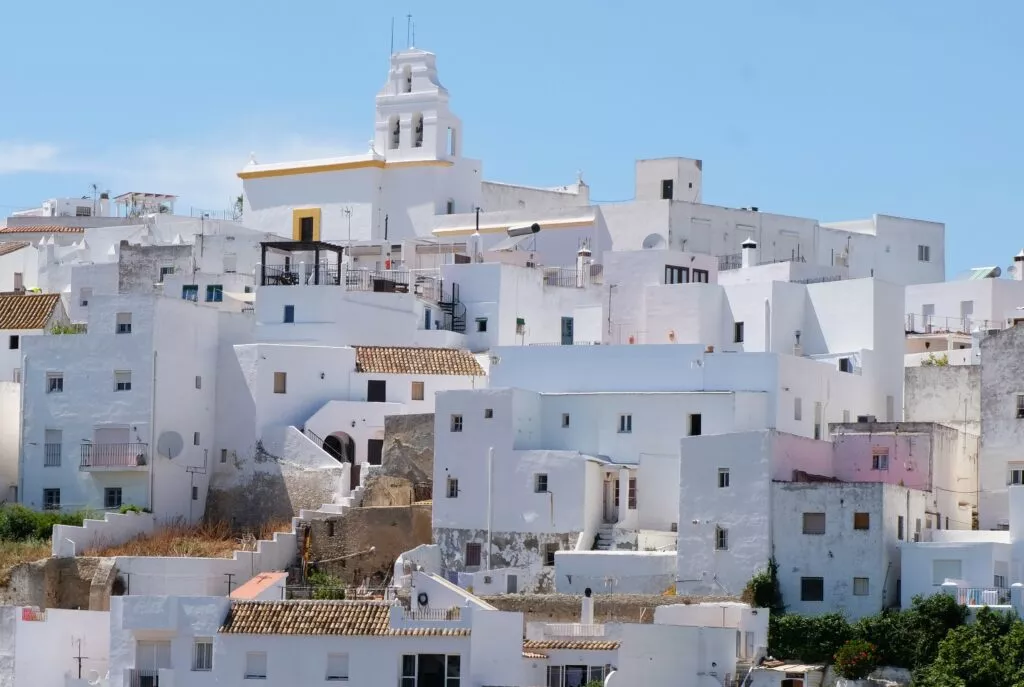
The viewpoints of Vejer de la Frontera:
- Don Quijote’s Mirador
- Mirador paseo de las Cobijadas
- Mirador de la cobijada
- Trafalfar’s viewpoint
- Mirador del Santo
Note: the last 2 are very close and are located in a street which has a very pretty name and which is very eloquent for viewpoints. They are on Miramundo ( look-at-the-world) Street.
Mirador of Aves Ibis Eremita a little treasure to see in Vejer de la Frontera
At the exit of the village, there is another very special viewpoint. This one bears the name of the species of bird, the bald ibis, which can be seen in this place. It is an extremely rare bird species and is even on the list of birds at extreme risk of extinction.
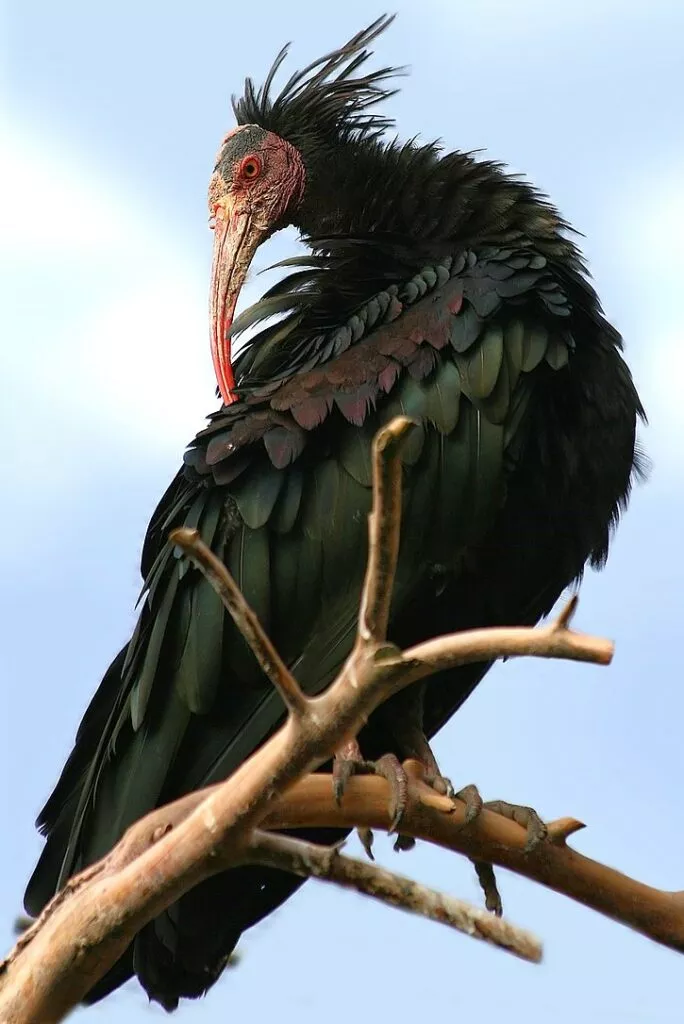
This place is the one and only place in Europe where eremita ibises live part of the year.
The Cobijada
The cobijado is the traditional village clothing that women have worn for a long time. This tradition has almost disappeared since the 1930s. Its origins are very ancient and are believed to be Castilian. This garment covered the face except for one eye!
Here is the statue homage to the cobijada: the woman who wore this outfit. It is sometimes worn today during traditional festivities.
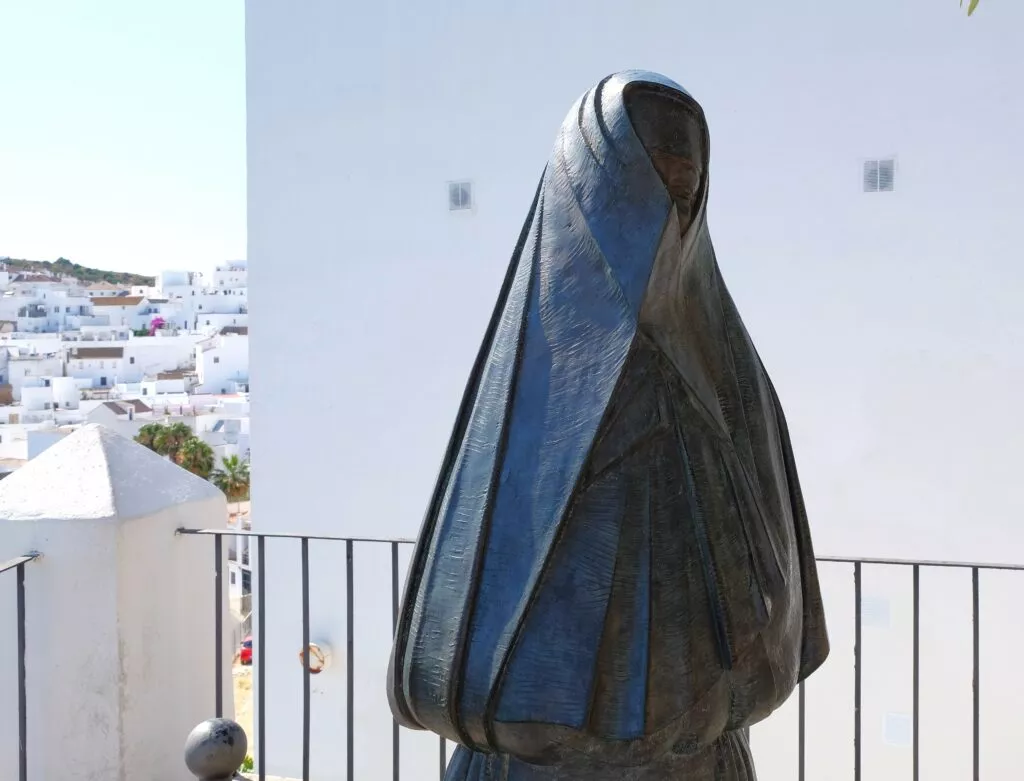
Where to have lunch in Vejer?
There are many places to eat well in Vejer. However, for those who want to stay a little in the atmosphere of the history of Al-Andalus, there is a restaurant to know in Spain Square.
It is: El Jardín del Califa
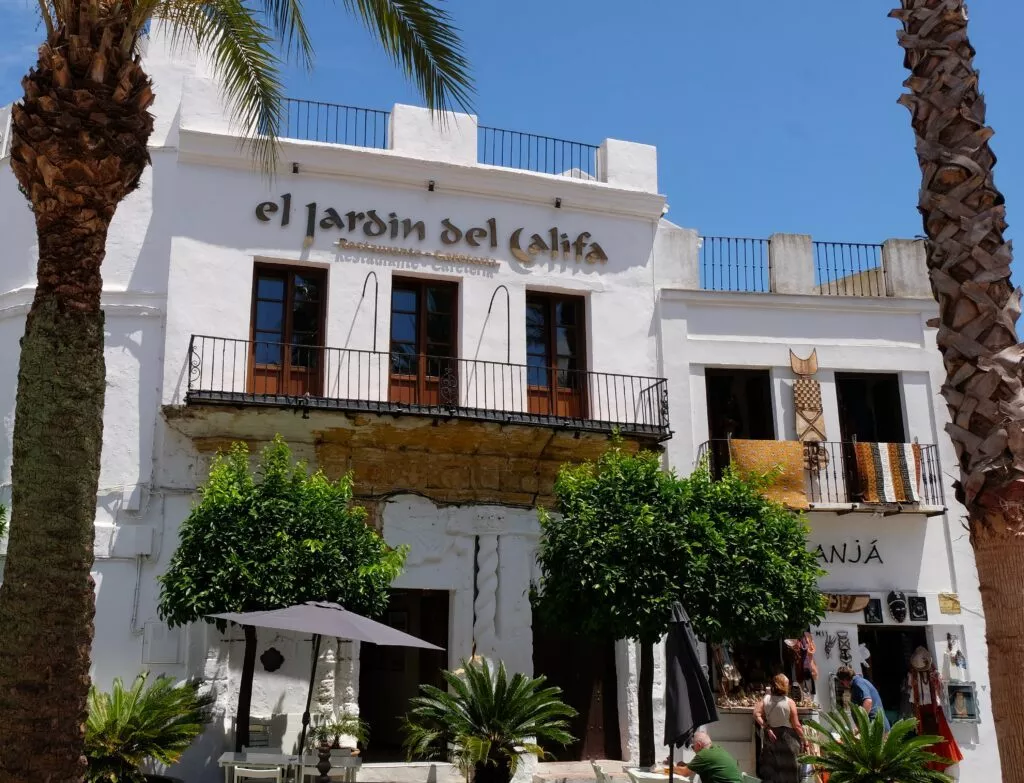
Here is its exact position on the map.
The beaches of Vejer
Vejer de la Frontera is located near magnificent sandy beaches, such as El Palmar beach, and Los Caños de Meca beach: La Mantegua.
El Palmar is the only beach attached to the municipality. However, its almost eight kilometers of soft, golden sand, as well as its width of almost forty meters, make it a true paradise.
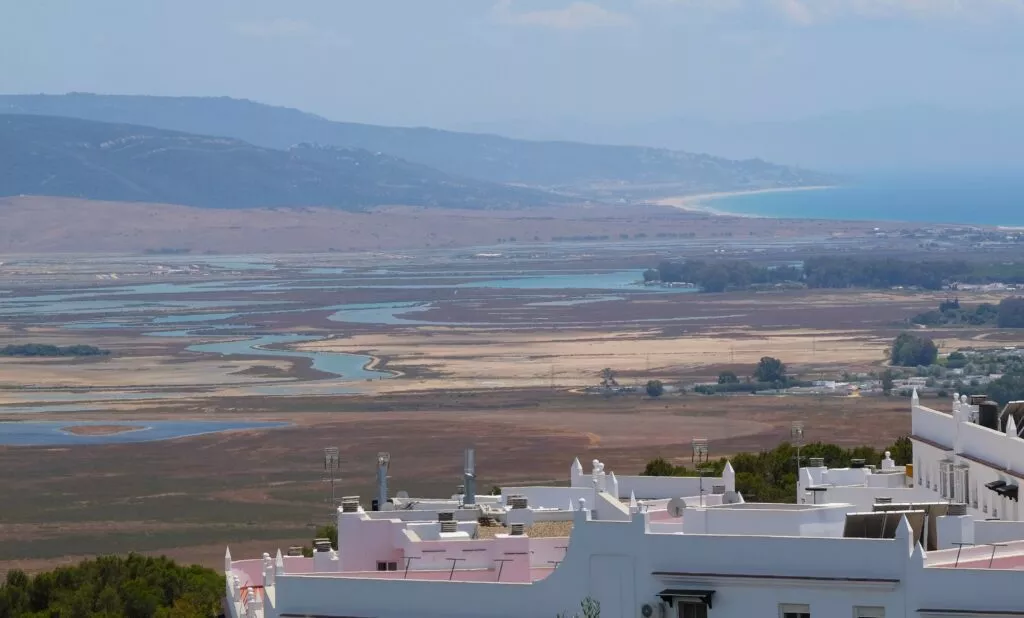
The scarcity of buildings in its surroundings and the respect for the environment make it a place that is difficult to forget.
In conclusion, Vejer de la Frontera offers a unique experience on the White Villages Route. In addition, its geographical location (sea, land, mountains) makes it a popular destination of choice, for tourists looking for authenticity and an insight into traditional Andalusian culture.
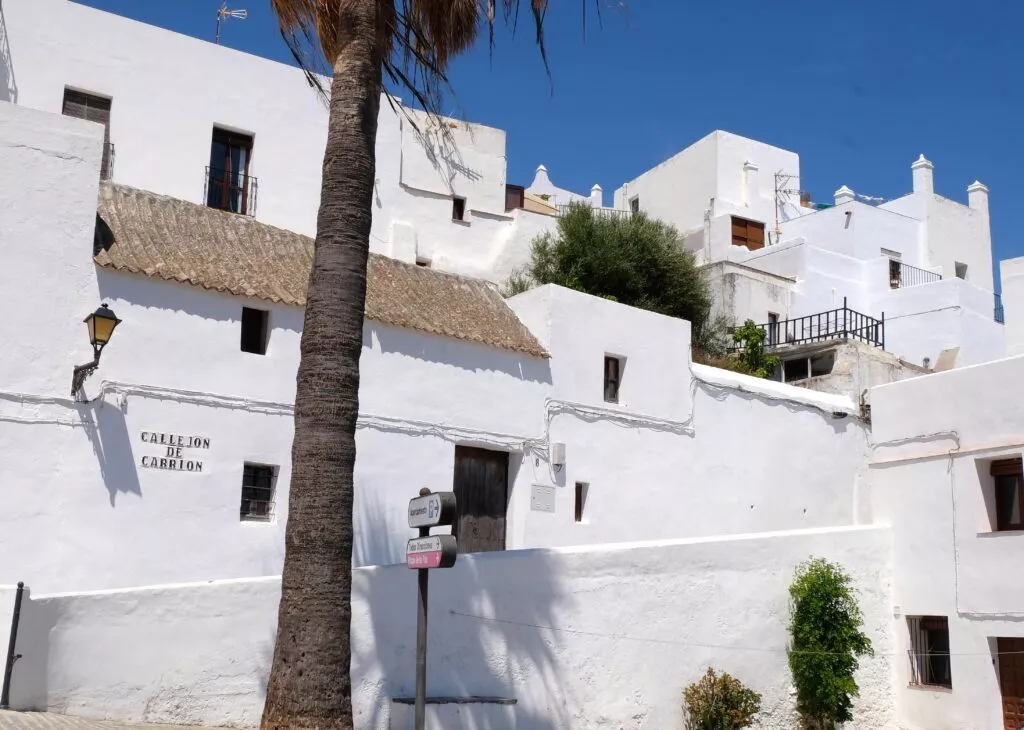
The possibility of spending a few days in Vejer, experiencing the kindness of its people, enjoying its magnificent gastronomy and staying in one of its charming accommodations, will make your visit an unforgettable experience.
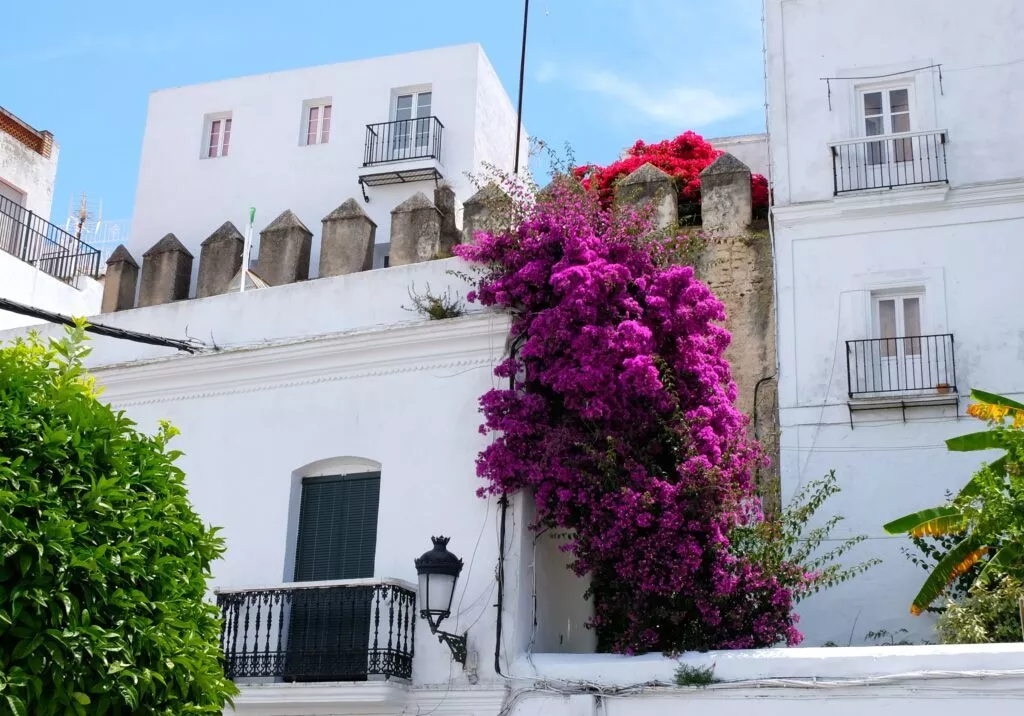
What activities to do in Vejer de la Frontera?
Below you will find the activities and tours offered in Vejer.
You can also book them online today (with free cancellation):
Book accommodation
Here is an idea for a hotel, a former convent, right in the center of this wonderful white village. This is the Hospederia Convento San Francisco.
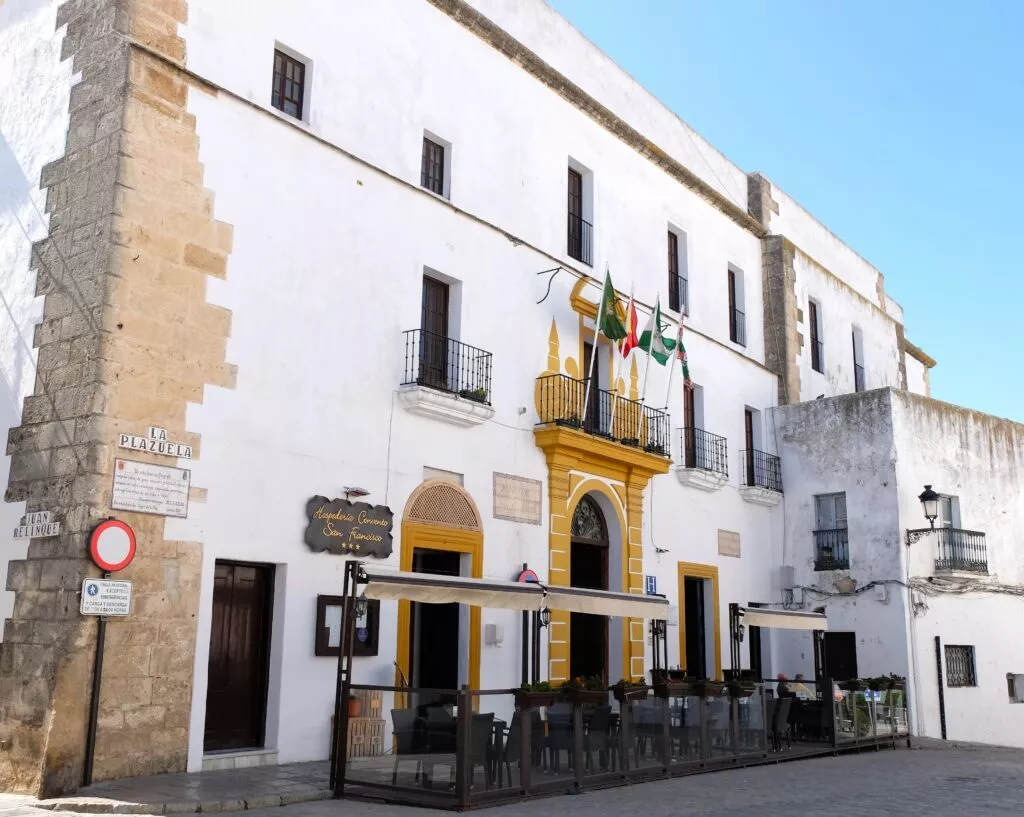
Here is the link to find out more, see photos and/or book the hotel: Tugasa Convento San Francisco.
Below you will find all the hotels and accommodation available in Vejer, after selecting your dates:
Dates of the Village Fair
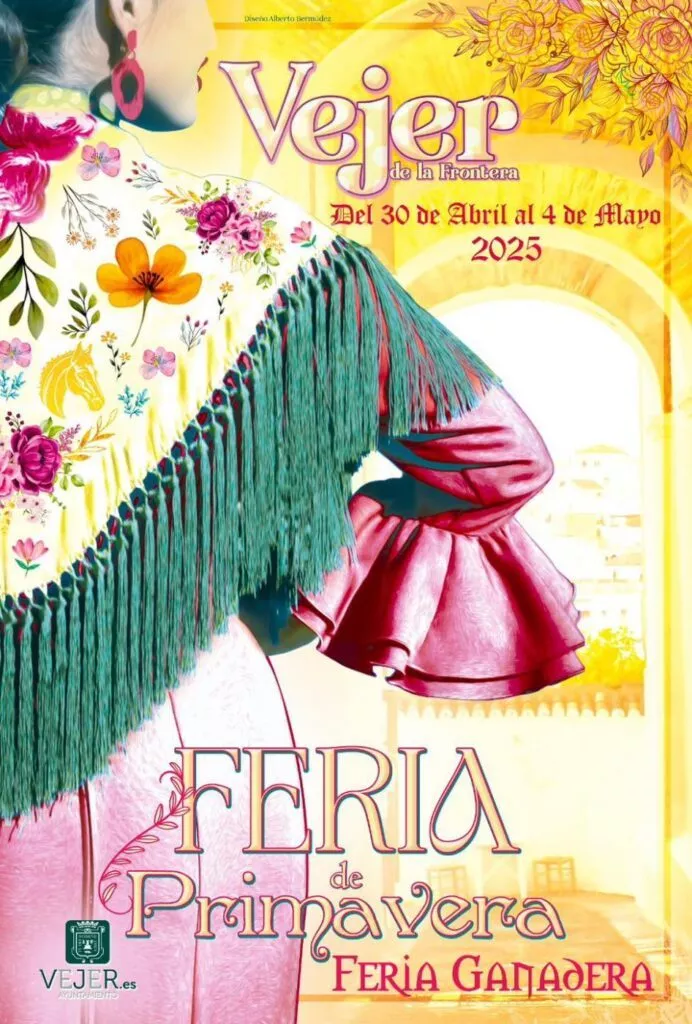
Some useful links for your trip to Andalusia
For those staying on the Costa del Sol and wishing to visit Andalusia, here are 8 magnificent excursions from Malaga, Torremolinos, Estepona or Benalmadena.
Easy and economical bookings
What to see around Vejer?
The white village of Medina Sidonia
Medina Sidonia, or Medina, as it is called locally is a white village with an intriguing name to discover:
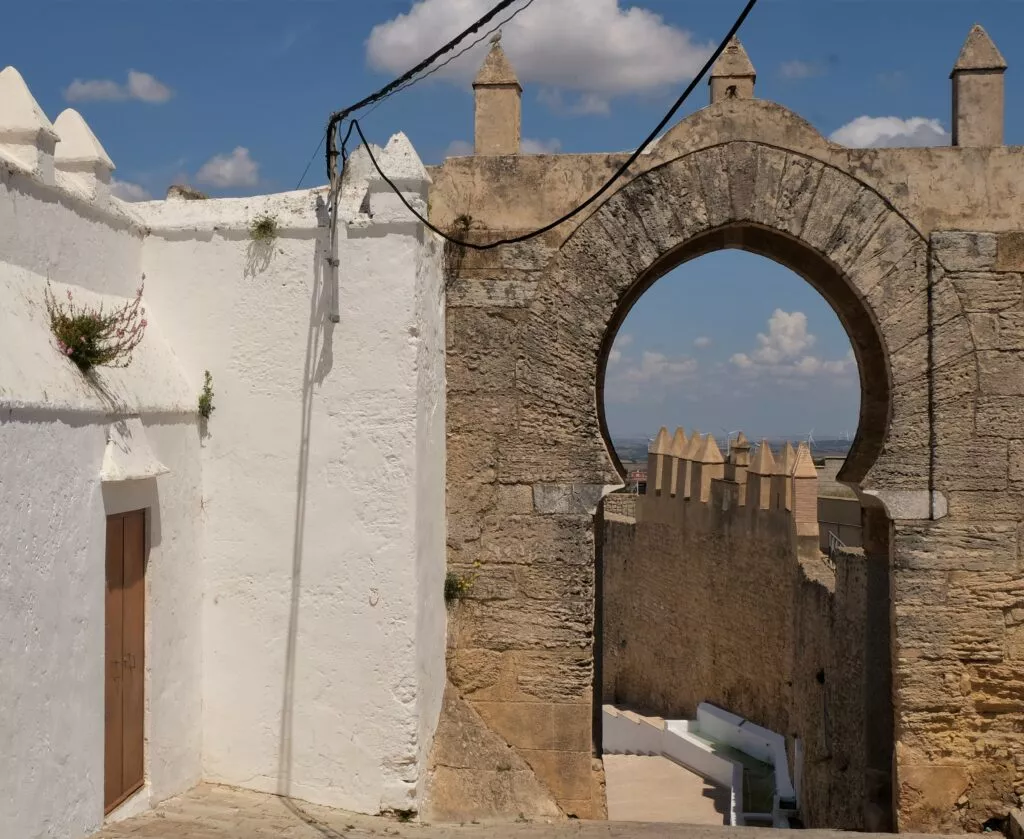
Discover Tarifa and its incredible beaches
Tarifa is a small town that you absolutely must discover for its history and its atmosphere. In addition, it is the only city in Europe, due to its geographical location, which has beaches in the Mediterranean and others in the Atlantic Ocean.
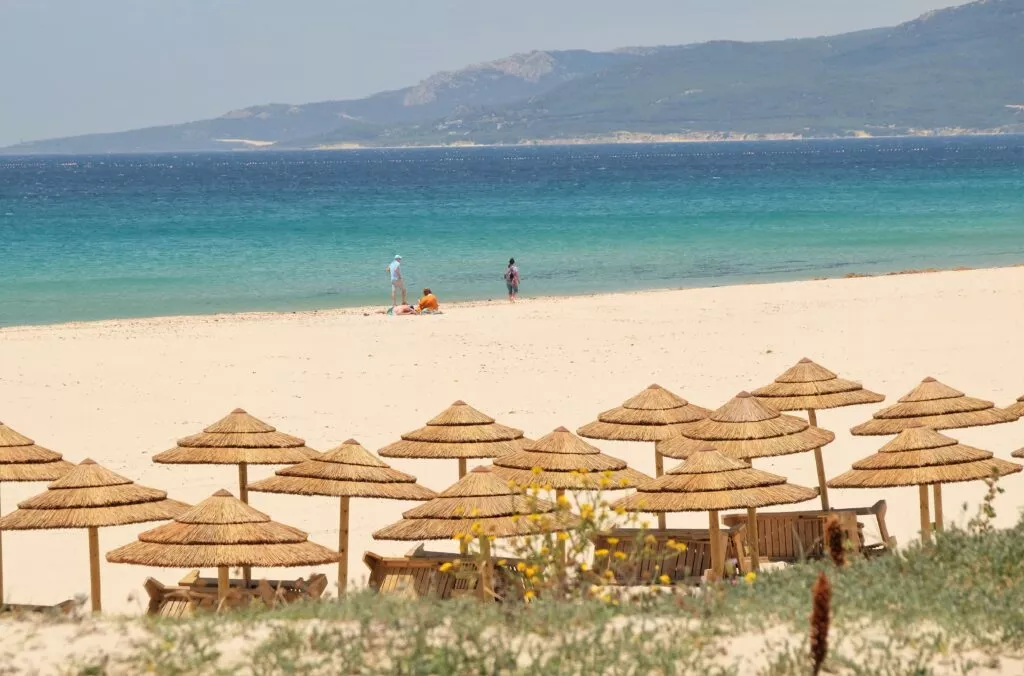
Here is the link to discover everything you need to see in Tarifa.
Visit Cádiz, the capital of the Costa de la Luz
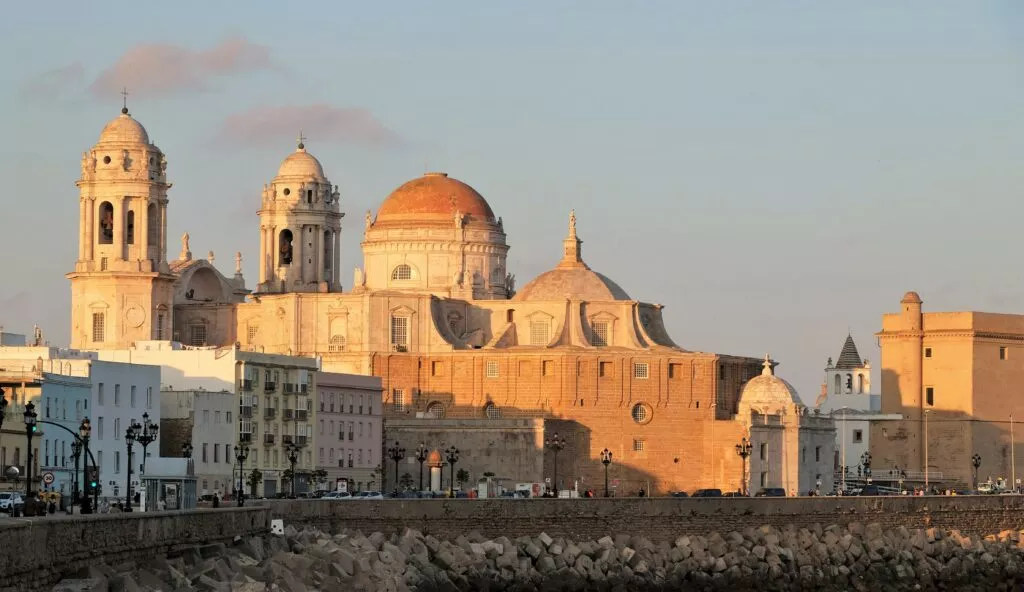
Visit Cadiz, a city with an incredible past and great beauty, on the Costa del la Luz.
Continue your trip to Andalucia
Malaga
When you reach the Costa del Sol you will find in this link what to see in Malaga :

Granada
Visit Granada, discover the Albaicin and Sacromonte districts:
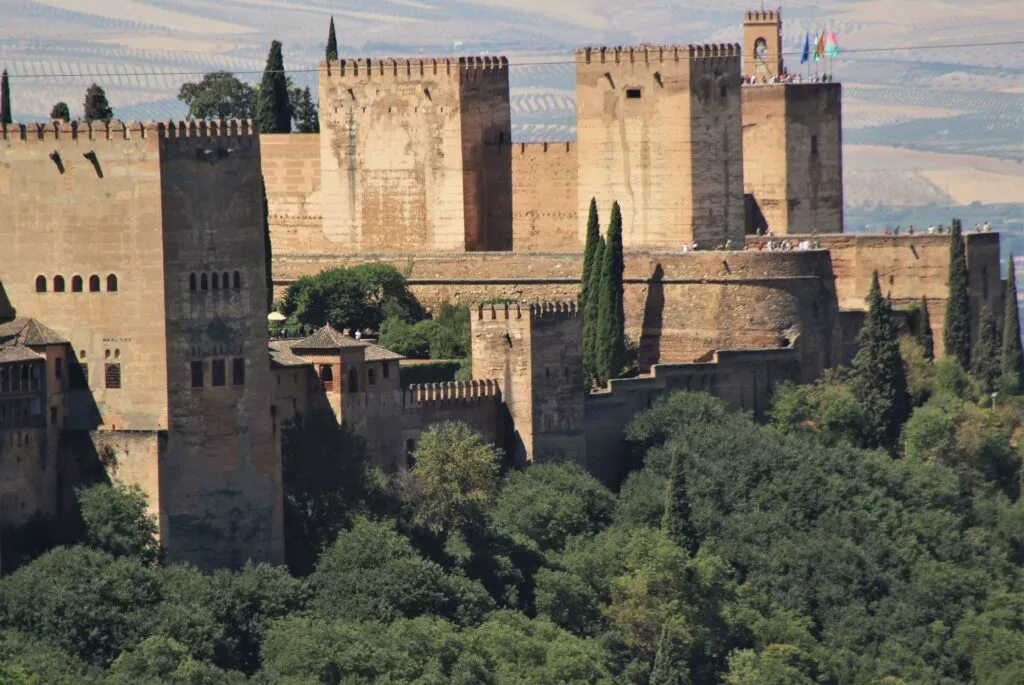
Cordoba
And of course, visit Cordoba, the caliphate city, and the Juderia district
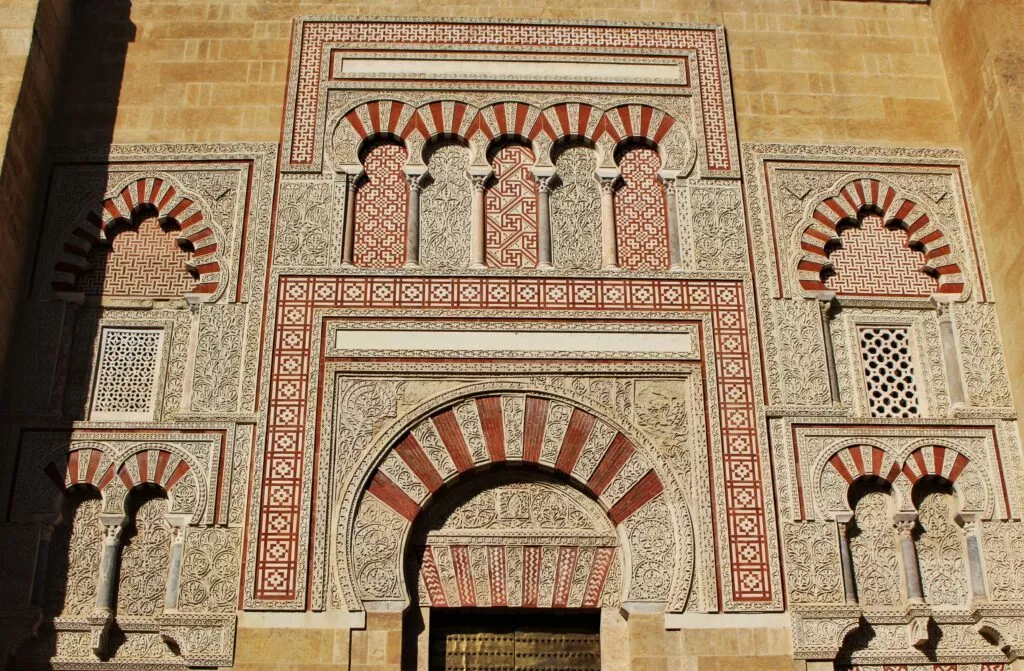
Discover more of Andalusia’s beautiful sites in the Andalusia blog pages.
Here is the link to receive our andaluciamia.com blog newsletter
Here are the latest articles on Andalusia
-
Interactive map of Andalucia with best places to see
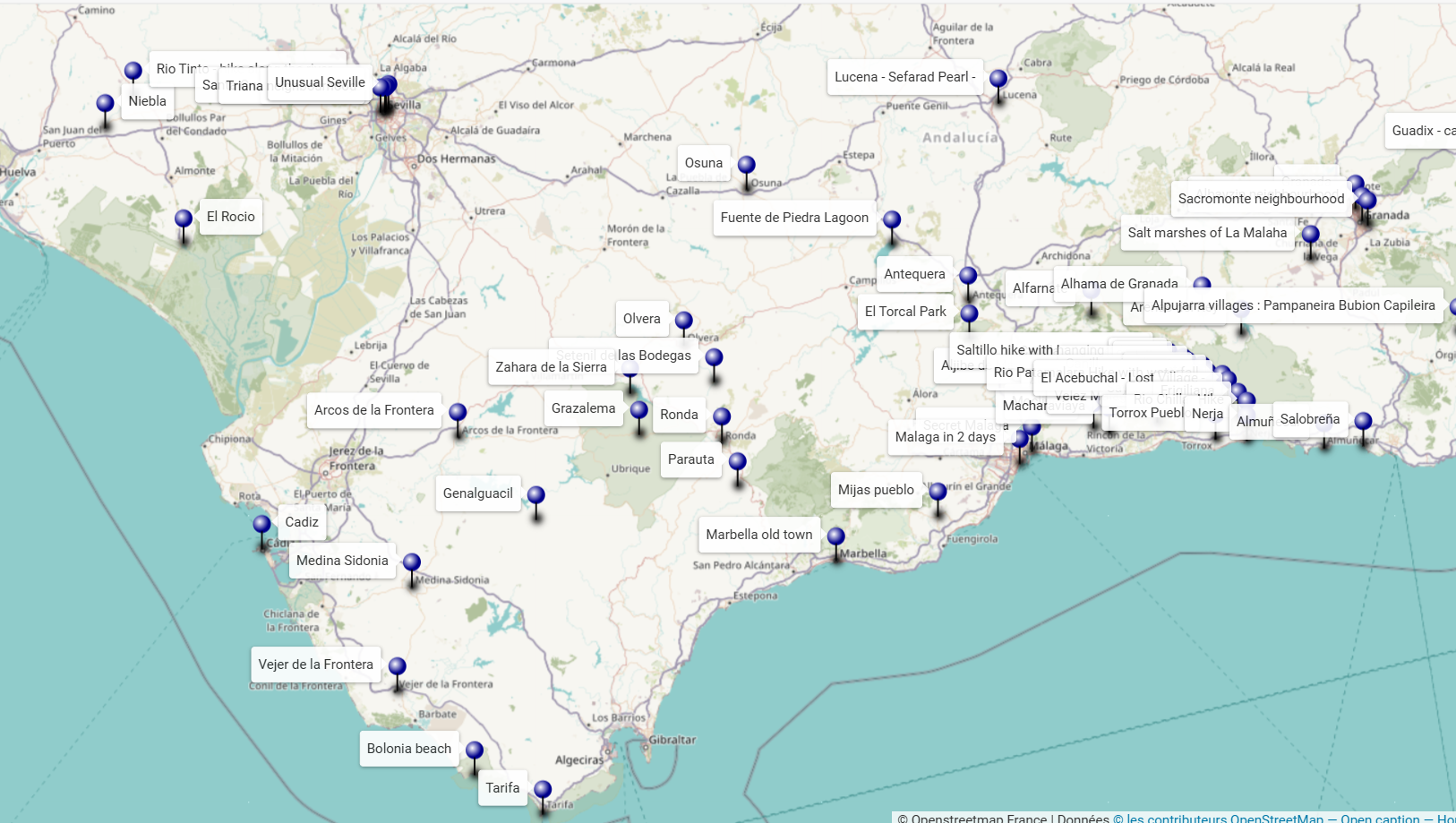
An interactive map of Andalucia to discover the sites to see around your holiday destination or to prepare a tour or road-trip.
-
Andalusia off the beaten track : 18 gems
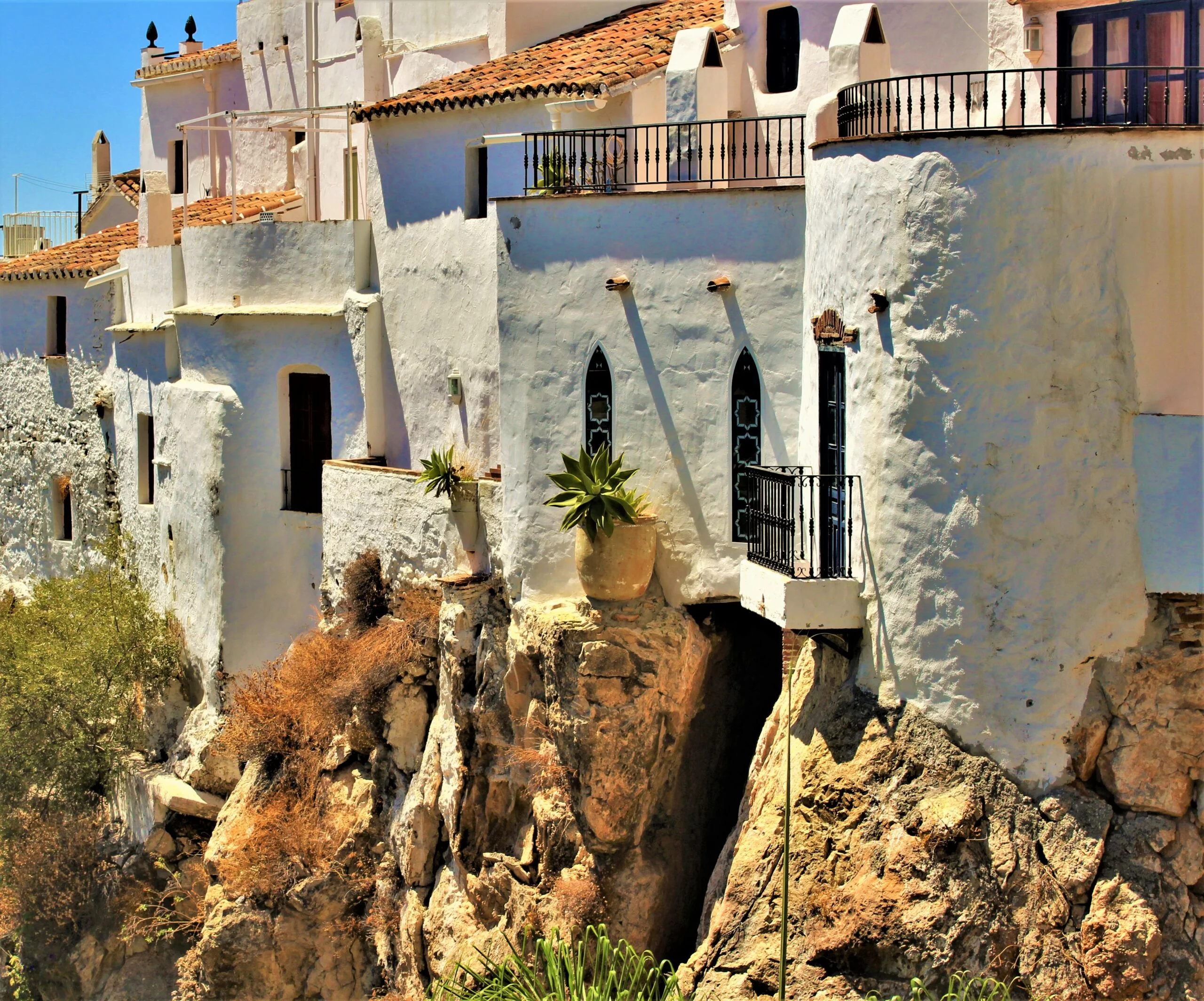
Let’s immediately set off to discover an Andalusia off the beaten track. There are many wonders to discover.
-
19 Most beautiful white villages in Andalusia
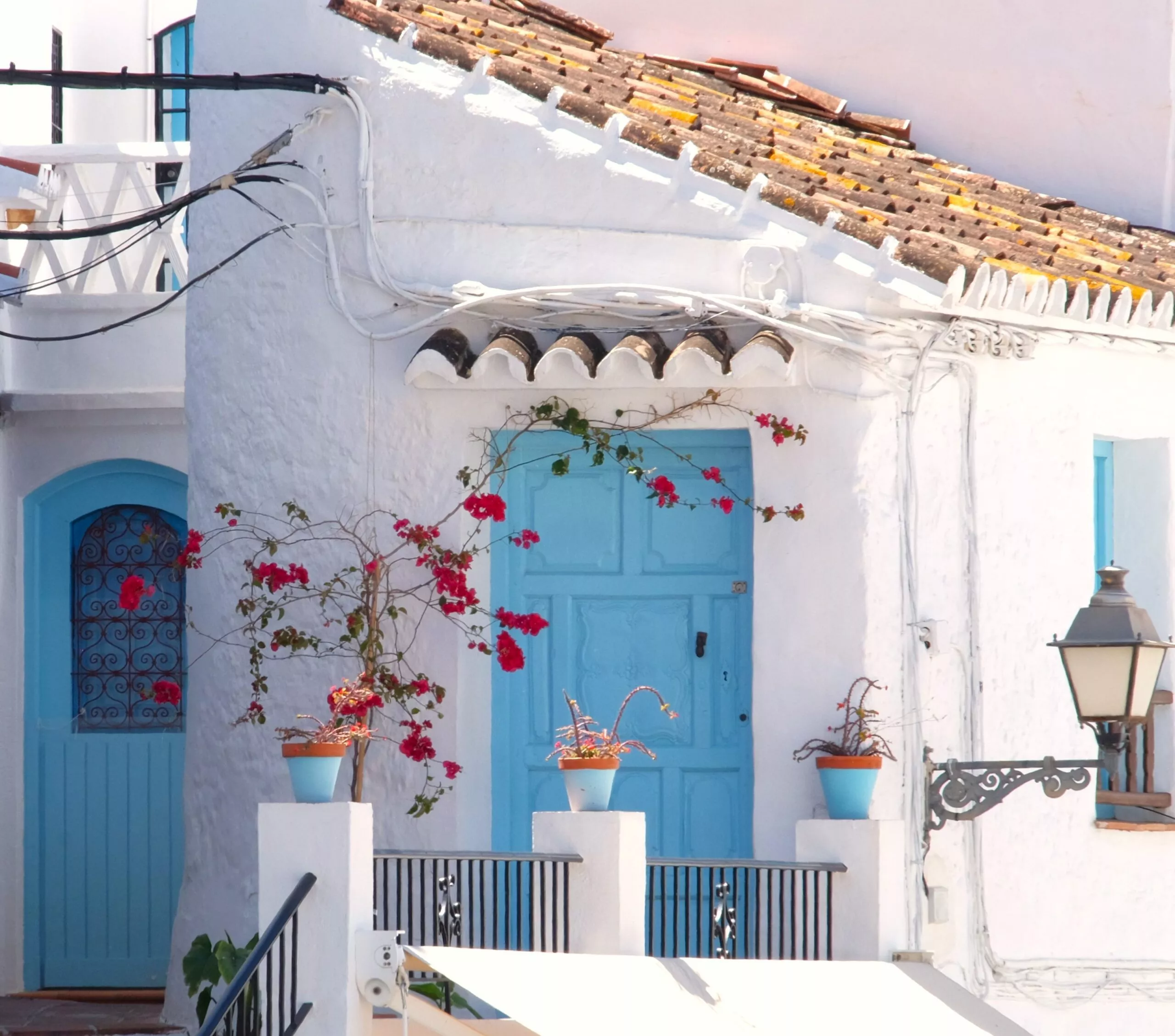
Discovering the most beautiful white villages of Andalusia. These villages are the only ones to be part of the Pueblos más bonitos de España.
-
Unusual Andalusia – 15 Very Surprising Places –
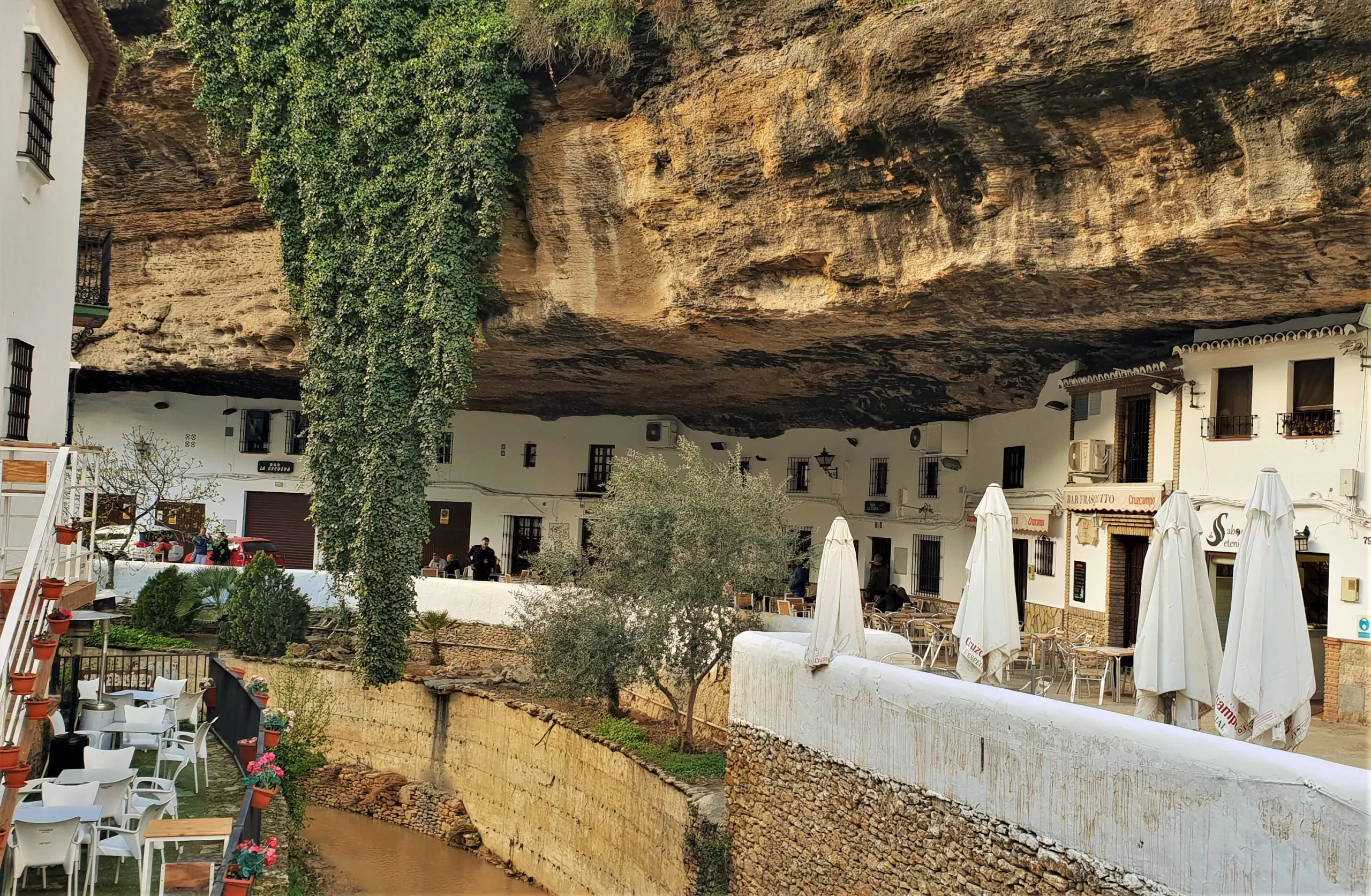
Unusual Andalusia: discover the most surprising and wonderful places in southern Spain.
